#congo open verses
Explore tagged Tumblr posts
Text

The Mad Mage's Congo Drum. Congo is a chill yet up tempo, versatile piece of music that is safe for any adult occasion. Background music, Freestyling, Cleaning, or just nodding your head and moving your hips to.
#congo drum#the mad mage#the mad mage's elixers#congo open verses#congo drum art#congo drum song#music#vibey#dance#african#freaky#freaky lyrics#dirty lyrics#chill music#vibe music#rap music#sing songy music#unstoppable union thee empire#uutempirenj#new jersey#usa
3 notes
·
View notes
Text
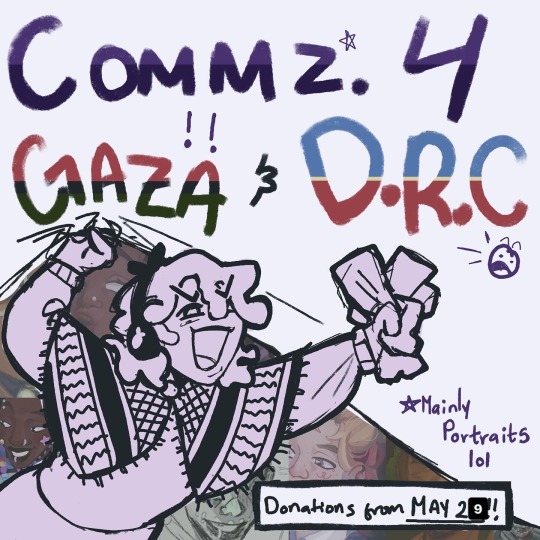


More info can be found on my instagram page :)
[image description in the image/alt thingy :)]
HEYYY SO COMMS ARE OPENING FOR GAZA AND THE DRC!!!
If you’d like a link to my doc then don’t hesitate to send a message! You don’t have to request a commission for it either :))
ALSO while Gaza and Congo were the main things on my mind while making this, I’m 100% DOWN to support donations for Sudan, Haiti, etc!!!
#art#free palestine#all eyes on rafah#eyes on congo#free congo#free drc#art commisions#art comms open#art comms for Gaza#commisions for congo#atsv#the magnus protocol#hobie brown#mp100#my tArt#across the spider verse#tagging the fandoms im in lol#dungeon meshi#delicious in dungeon#🍋🟩’s art
345 notes
·
View notes
Note
Happy Wednesday!
If it tickles your fancy, I would love, love, love, love, love a fic of any flavor in the Mob Wife Alexander Lightwood universe you just casually yeeted onto my dashboard because that's obviously going to live in my head rent free for the next many moons. <3
(What a world omg)
Laws i love this verse so it will always tickle my fancy to get prompts and saeth keeps sending me things that boost my interest. Well this is definitely a flavor in that verse and I hope you enjoy it because it took a turn I didn’t imagine it taking.
Seriously I never planned this character to be in the fic or ever write from their pov and then it was like ‘oh hey interesting let’s do it”.
So this is basically an interlude after Alec’s figured he could either be a bodyguard or a boytoy and only one of those gets to flirt and touch Magnus all night.
Simon pov (he’s an unreliable narrator, prone to rambling, anxiety and dramatic and humorous interludes and he lacks so much info)
Alec is just like: I would just like to get back to my husband. he doesn’t sleep as well when I’m gone, so please talk as little as possible and just listen first.
Simon: I’m so glad I can’t breathe. If I move he’ll kill me.
(also mob wife is an occupation not a gender role but Simon doesn’t get that… yet)
—
“Simon.”
And Simon shivers because Alec Lightwood doesn’t need to raise his voice to be terrifying.
And Simon is terrified.
Officially.
But also not overwhelmingly so.
Because he’s also finally seventy percent sure Alec won’t kill him, which is much better than the fifteen percent Simon thought it was until recently.
Though in a crisis, he’s also the one Simon wants to hide behind.
Even in the beginning, Simon’s chances were always better with Alec, even if they both complained about it.
“Okay, yeah right. I’m Simon.” He hears himself say and he reminds himself to take a breath even though he doesn’t need to.
A lack of heartbeat and oxygen only mean that even Simon’s own body won’t save him from panic anymore.
“Yes? I know you’re Simon.”
And Alec says it like it's an obvious conclusion but Simon is just really happy to hear him say it, especially without a threat.
Because Alec isn’t the kind of person who is casual with most people and Simon is almost nothing to him.
Sometimes Simon worries he’s just another body to Alec — one in the congo-line-of-lovers that Izzy has had — but then Izzy reminds him he’s the only boyfriend Alec’s bothered to remember the name of.
And Simon is also one half of Clary’s package deal and boy, that sure did him no favors when they first met.
He takes pride in it.
“Simon—“ Alec says and he’s sighing, deep and long and Simon wonders if his inattention and eagerness has once again doomed his — now second — attempt at living.
Well living while being dead but Simon might actually stay dead this time if he lets his thoughts keep going.
“The greenhouse?” Alec is asking him and Simon wonders why until he remembers how much he hates Alec’s office.
The greenhouse is the only other place Alec takes official meetings.
And something shivers down Simon’s spine.
Because Alec doesn’t even like him but he’s noticed Simon’s dislike.
This is an Alec that’s trying to be careful.
So just how much does Alec notice? Simon wonders and the little part of his brain that he’s learned can save his life tingles.
Where does it end?
“For the love of, Simon sit the fuck down and breathe every fifth count.”
Simon finds himself on the hard marble of the Institute’s unfamiliar greenhouse floor. His head between his knees and a too heavy hand roughly smacking his back in sets of five.
There is brightness on his face when he finally opens his eyes.
“This is sunlight!” He accuses angrily, because he finally trusted Alec a full seventy percent and now this.
Betrayal!
“Simon you’re a daylighter. You were blasted by the soul sword and survived. You’re fine.”
And Alec doesn’t sound sympathetic and Simon winces because well—
Okay yeah. That’s fair.
Plus Alec has seen Simon drunkenly dance naked in the sun and that is a memory neither of them talk about.
It actually calms Simon down, because if Alec refrained from killing him when he plastered his naked body to Alec’s and yelled ‘teach me how to fight future brother-in-law!” Alec had in fact, spared his life.
First by not killing him.
And secondly, for not telling Magnhs that Simon’s no-good-very-bad-brain decided it was perfectly reasonable to cop a feel of Alec’s ass with vampiric strength.
It’s not a bad ass.
A little flat but very muscular with thighs that could break a neck and Simon tries very hard not to work himself back into a panic.
He does not need Alec Lightwood bringing him down from a panic attack while he thinks about how he nakedly gropped Magnus’ Bane husband’s ass hard enough that Alec had sighed and in the medical bay he’d dragged Simon to, activated an iratze.
“Magnus is going to know that these marks aren’t his.” Alec had said casually, “and he’s not going to like it. I really didn’t like it. You certainly didn’t like it either, if you know what’s good for you. So therefore, this never happened.”
And Simon is never ever going to tell even Clary that he did like it.
He’d liked it very much and he’d suddenly understood Magnus’ instant obsession.
Which had turned into a new crisis.
Because Simon’s taste is apparently Lightwood’s.
Which is not helpful for his continued life expectancy.
Because it will either be Izzy for eyeing up her married brother, Magnus for eyeing up his husband, and Alec for Simon’s sheer audacity.
“Simon, do I need to get someone else?”
“No!” Simon manages to get out because Alec Lightwood-Bane can never find out that he snapped out of the panic attack three minutes ago and almost sent himself into another panic attack because of said man’s ass. “I’m good. I’m good.”
Alec doesn’t look impressed but Simon knows he must not look very impressive.
He doesn’t take it personally.
Alec isn’t impressed by anyone besides Magnus, unless he’s impressed by someone’s stupidity.
And that never turns out well.
“Okay, so what can I do you for? I mean for you. What can I do for you?”
Alec is eyeing him like Simon is Magnus’ awful snake Baby.
Which is rude.
Because Simon has seen Alec with that nasty little worm and Alec is much nicer to Baby than he is to anyone besides Magnus and Madzie.
“Okay so listen carefully. This is a lot of information I’m going to give tou. Magnus has several identities in the mundane world. Some of them are linked legally but most of them are involved and hold a great deal of power in mundane crime groups.”
“Magnus is a mob boss!” Simon gasps out in giddy delight and then Alec is ruining his joy like the grumpy dilf he is.
The grumpy dilf he is not.
Because Simon doesn’t even know what a dilf is and he’s never been so glad that Alec can’t read his mind.
“No Simon. He’s not actually running a mob or gang or whatever else you’re thinking. He’s simply a powerful individual and is known for his information and skills and he has a lot of money. Nobody wants to be on his bad side. Everyone wants to be on his good side. So he has the authority of someone high-up and even the mundanes behave in Brooklyn. I personally don’t really care how Magnus got his status or how he maintains it.”
And Simon has so many questions but Alec has his—
if-you-interrupt-me-I’m-shoving-my-hand-through-your-chest-and-exiting-with-your-heart
— look on his face.
And Simon has seen that security footage. So he stays silent.
“It’s a persona that most High Warlocks do. Create identities in the mundane underbelly of their territories. Make sure the mundanes fear and respect them enough that they can come and go freely. They need to be trusted to keep an eye on any slip-ups. And no, they’re not undercover. They’re not doing the mundanes work for them.
“But Magnus and I quite honestly don’t care. We protect mundanes from the shadowworld, not from themselves. If the mundanes want to kill themselves and each other, that’s their problem. So long as they only do it in mundane ways and not with ties to the shadowworld. We don’t need the clave coming down here, bristling about the accords anytime soon, or anytime at all.”
And Simon swallows because he understands how serious this is, intimately.
Aldertree was sent by the clave.
He remembers Aldertree.
Izzy remembers Aldertree.
A lot of people remember Aldertree.
So he keeps focused, listening to the hummingbird-wing-beat of Alec’s pulse under his words.
“Magnus has done this for centuries. He knows what he’s doing. But we’d both prefer if I could go with him in the future.”
And Simon is practically vibrating because he’s nearly positive that he’s about to get a padawan.
Which, even in such a serious situation, is amazing!
“Which means I need to know more about modern mundane culture than I do.” Alec is grimacing and Simon knows it’s a testament to just how much Alec loves Magnus that he’s doing this.
“Magnus gets by because he has centuries of knowledge but I’ll need a crash course. And no Simon, I cannot read your mind.” Alec Lightwood’s eye roll continues to be a thing of beauty and Simon feels his undead soul un-die a little more. Because Alec definitely can’t read minds.
Or Simon wouldn’t continue existing.
“Look, Magnus and I went over a list of all the questions you might possibly ask. He gave me the answers so I didn’t have to waste time. We both agreed you’d be the best to ask, since you spend the most time around young adult mundanes. And you’re popular with your peers.”
Simon feels like he’s dreaming or maybe died again.
Except this is a much nicer if not possibly a more traumatizing experience than his first death so Simon concludes it has to be real.
His luck is always this bad.
“Magnus thought and I agreed that it would be just you and I, you tend to—“ and Alec trails off and Simon has a moment where he wishes he’d never drank Jace’s blood.
Because Alec is trying to be considerate.
Because he’s trying not to say that Simon can’t handle being in the same room with both of them after the incident.
It’s mortifying.
“Right, so do I need to call Magnus so he can join us?” And Alec looks very serious, eyes dark and calm and without a flicker of anger or of true concern. Alec is a good leader not because he cares but because he makes himself act regardless of care.
It took a while for Simon to realize that sometimes the people who care the most are the ones who let you down the worst.
And Simon winces, because Alec does look incredibly tired compared to when Simon saw him… however long ago.
“No sorry. I’m good, just a surprise. But like a good surprise, it’s like I’m Q and—“ and Simon trails off with a sigh because there’s no point and he is shocked when Alec runs his big hands over his scruffy perfect Lightwood face.
Or maybe it’s his Trueblood genes.
Whatever.
“Yes, okay fine. Simon you can be Q. But if you call me 007 or whistle that obnoxious tune I will give you cause to regret it.”
“You know 007?” Simon actually gasps, because this might truly be some epic dream and he doesn’t even register the threat.
Well, his hindbrain does and it’s screaming, but Simon can’t listen to it over the shockhold Alec’s words have put him in.
“Simon, consider who my husband is. Just for a minute.”
And Simon does consider it.
He considers how a delighted and charmed Magnus would coax Alec into ‘research’ for his ‘undercover excursion into the mundane world’.
“Oh my god.” Simon barely breathes out, “Magnus made you marathon them.”
And Alec is gritting his teeth. Simon can hear the grind of his incisors and he swallows, hard.
“Right. Absolutely no mentions of triple digits or shockingly appropriate theme songs.”
And Simon’s death flashes—
hunger the dirt the gnawing-bite-thirst-trap-feed of hunger and Clary’s screams
— before his eyes when Alec gives an exasperated sigh.
The moment passes and Alec is giving him a begrudging yet judgmental look.
“It’s often that the criminal part of mundane life is where the shadow world slips over. Magical drugs slip into mundane ones, easy money, anything goes. And no one cares about that except sometimes it leaves evidence. Unexplainable evidence that mundanes want explained. Right now Magnus is chasing a new rumor; and we’d like for me to be able to go with him.”
This is quite possibly the single coolest thing Simon has ever been involved in.
“So are you going in as his bodyguard? A new dealer of some super magic drug? Oh. My. God. Alec, are you going to be a rival boss or something coming in? Or a hitman? Are you going in as Magnus’ cleaner?”
And Alec is staring at Simon like he’s actually truly lost it.
Which Simon doesn’t get. They’re all obviously the best and most understandable choices.
“Simon, Magnus is my husband. Obviously I’m his mob wife.”
And Simon can’t breathe, but he feels the oxygen knocked out of his lungs.
Because Alexander Gideon Lightwood-Bane — a man who has prevailed heavily in both Simon’s nightmares and his recent and most horrifying wet dreams — wants to learn how to be a proper mob wife.
“Oy vey.” Simon manages to get out and then he looks up at Alec and blinks at his too-tall, too-powerful body.
And wonders how he’s supposed to guru Alec into anything that can pass as what middle-aged criminals will consider a wife.
Mob or otherwise.
Later they’re finally finishing up their first crash course and Alec looks worse than he did with his own arrow through his chest.
But he escorts Simon out, ordering his shadowhunters absently to various duties and checking in as he passes and Simon takes it in with a sudden wonderment.
Simon’s seen more changes of leadership in his short time as a part of the shadowworld than is normally seen in a generation.
And he got a much more up-close and unwanted personal view of how badly it can go.
And Alec is… he’s surprisingly really great. Even if Simon only has shitty examples to compare him to and so when Simon is walking out into the sun and Alec is going through a portal that appears out of nowhere, he lets his guard down and mutters.
“He’s so totally M.”
And just before the portal warps out of existence, Simon’s hearing picks up a quiet, irritated—
“Simon.”
And he winces.
Alec’s senses are frightening and Simon is a vampire.
#shadowhunters#magnus bane#alec lightwood#malec#simon lewis#writing wednesdays#writing wednesday#lumine writes#my fics#my fanfics#my ficlets#immortal husbands#shadowhunters au#prompt fic#prompt#fill#dressed to kill
89 notes
·
View notes
Text
Hi Hey Hello!
I’m Cain! The owner of this blog and my side account, @biblical-sleepy-ash , which is my repost account if you want to see if I’m still alive when I die for two months.
I’m a fanfiction writer who tries to write as much as they can but, reality! But I make do with what time I have and try to fill it with drabbles and requests.
He/They ✧ Hy/Hom
↻ Current interests — Death Note, DC, Sonic, Servamp
↺ Dormant Interests — Call Of Duty, Monkie Kid, Marvel, Mortal Kombat, TMNT, Spider-Verse
➥ Writing and requests ♡
I take requests and will answer any asks people send! I love love LOVE rambling but only usually do when prompted, so I highly encourage people to pop over into my inbox to leave requests and inquiries! I’ll absolutely respond.
On the request end, I’ll practically write anything besides explicit NSFW and severely taboo subjects — incest, pedophilia, the whole shebang — but from that I’m open! Anything mentioned in my interest list will be written and probably past that.
AO3 ➥ Forgot_my_gender
Below is a list of organisations I highly encourage you to donate to! Or atleast spread awareness about :)

Organisations ♡
The Trevor project: A Non-Profit Organisation that provides helplines for LGBT youth and other resources.
LGBT Foundation: A UK centered LGBT Foundation created with the goal of helping LGBT Youth and Educating
Care for Gaza: Charity Organisation that provides help and relief to those in Gaza experiencing Genocide by Israeli forces.
Friends of the Congo: Organisation that works to provide relief to those experiencing silent Genocide in Congo and works to bring awareness about Congolese issues.
Arab.org: Click to donate funds to those in Palestine
Gazafunds: Lists of vetted Palestinian donation campaigns
1 note
·
View note
Text
Dead Poets Society (1989)
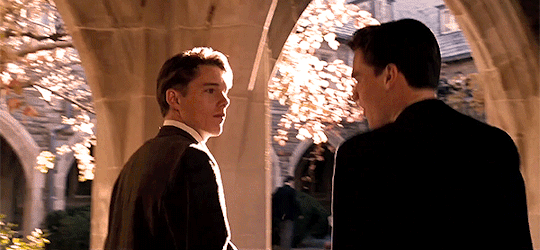
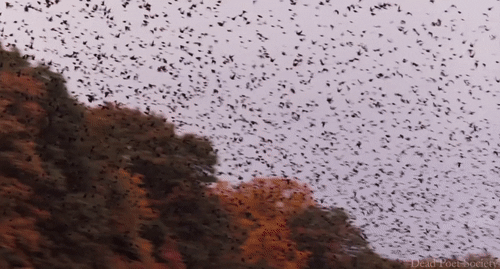
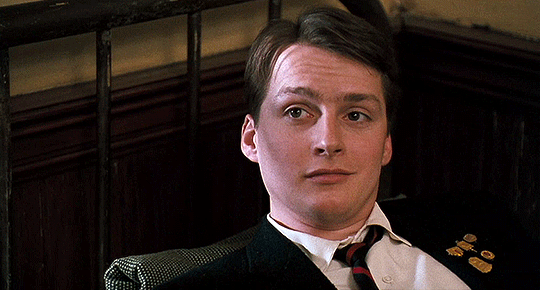
John Keating: O Captain, my Captain. Who knows where that comes from? Anybody? Not a clue? It's from a poem by Walt Whitman about Mr. Abraham Lincoln. Now, in this class you can either call me Mr. Keating or, if you're slightly more daring, O Captain, my Captain.
John Keating: I was the intellectual equivalent of a 98-pound weakling. I would go to the beach and people would kick copies of Byron in my face.
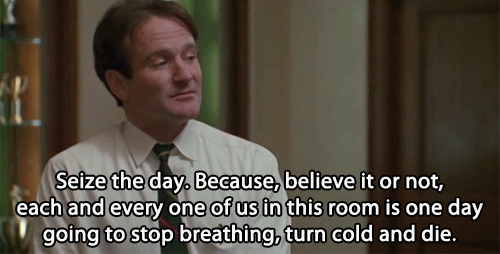
The above gif is misquoting a bit here. It annoys me, so I’m providing the proper quote:
John Keating: Because we are food for worms, lads. Because, believe it or not, each and every one of us in this room is one day going to stop breathing, turn cold, and die.


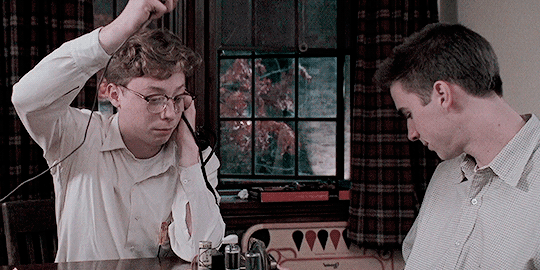

[after hearing "The Introduction to Poetry"] John Keating: Excrement! That's what I think of Mr. J. Evans Pritchard. We're not laying pipe! We're talking about poetry. How can you describe poetry like American Bandstand? "I like Byron, I give him a 42 but I can't dance to it!"
John Keating: This is a battle, a war, and the casualties could be your hearts and souls.

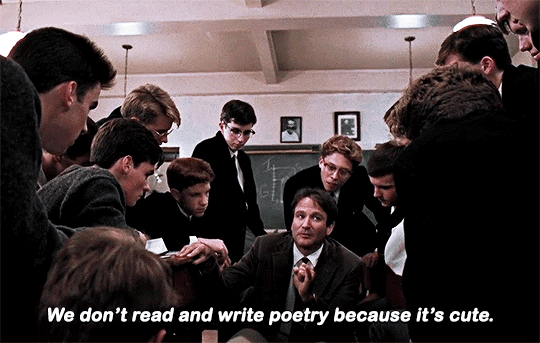
John Keating: We read and write poetry because we are members of the human race. And the human race is filled with passion. And medicine, law, business, engineering; these are noble pursuits and necessary to sustain life.
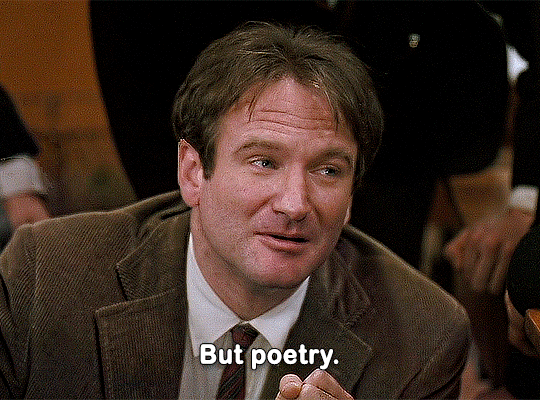
John Keating: Beauty. Romance. Love. These are what we stay alive for. To quote from Whitman, "Oh me! Oh life! of the questions of these recurring, Of the endless trains of the faithless, of cities fill’d with the foolish ... What good amid these, O me, O life? Answer. That you are here -- that life exists and identity, That the powerful play goes on, and you may contribute a verse.” That the powerful play goes on and you may contribute a verse. What will your verse be?
McAllister: "Show me the heart unfettered by foolish dreams and I'll show you a happy man." John Keating: "But only in their dreams can men be truly free. 'Twas always thus, and always thus will be." McAllister: Tennyson? John Keating: No. Keating.
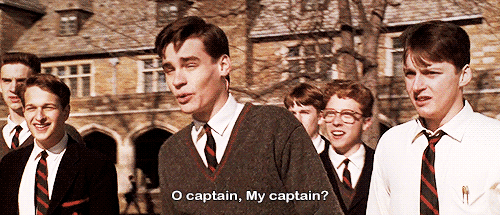
John Keating: Language was developed for one endeavor, and that is... Mr. Anderson? Come on, are you a man or an amoeba? [Todd stays silent] John Keating: Mr. Perry? Neil Perry: To communicate. John Keating: No! To woo women!

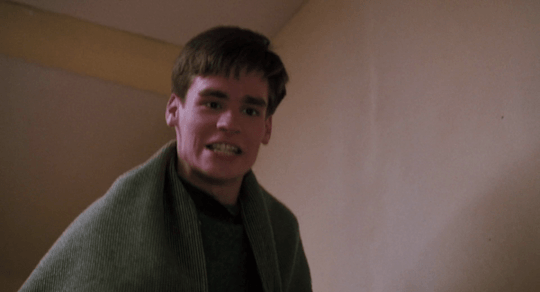


Todd Anderson: YAWP! John Keating: There it is! You see, you have a barbarian in you after all! Now, you don’t get away that easy. There’s a picture of Uncle Walt up there. What does he remind you of? Don’t think, answer. Go on. Todd Anderson: A m-m-m-madman. John Keating: What kind of madman? Don’t think about it! Just answer again. Todd Anderson: A cr-crazy madman. John Keating: No, you can do better than that. Free up your mind. Use your imagination! Say the first thing that pops into your head, even if it’s total gibberish. Go on, go on! Todd Anderson: A-a-a sweaty-toothed madman. John Keating: Good God, boy, there’s a poet in you after all! There. Close your eyes. Close your eyes! Close 'em! Now, describe what you see.

Todd Anderson: Uh, I-I close my eyes. John Keating: Yes. Todd Anderson: Uh, and this image floats beside me. John Keating: A sweaty-toothed madman. Todd Anderson: A sweaty-toothed madman with a stare that pounds my brain. John Keating: Oh, that's excellent! Now, give him action; make him do something! Todd Anderson: H-His hands reach out and choke me. John Keating: That's it! Wonderful, wonderful! Todd Anderson: And all the time he's mumbling. John Keating: What's he mumbling? Todd Anderson: Mumbling truth. John Keating: Yeah, yes. Todd Anderson: Truth like-like a blanket that always leaves your feet cold. John Keating: [some of the class start to laugh; Todd opens his eyes, Keating blocks them to get him to close them again] Forget them! Forget them! Stay with the blanket. Tell me about that blanket! Todd Anderson: Y-Y-You push it, stretch it, it'll never be enough. You kick at it, beat it, it'll never cover any of us. From the moment we enter crying t-to the moment we leave dying, it'll just cover your face as you wail and cry and scream. [Todd opens his eyes, there’s a long pause, then the class applauds] John Keating: Don't you forget this.

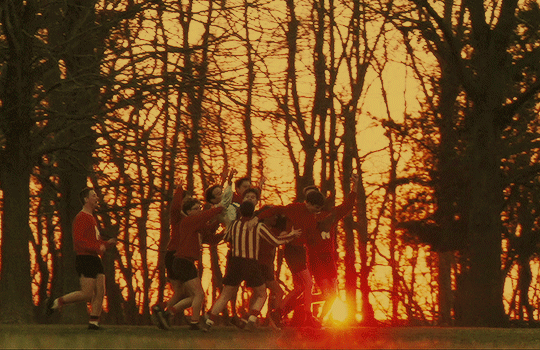

John Keating: Even though others may think them odd or unpopular; even though the herd may go, [imitating a goat] John Keating: "That's ba-a-a-a-ad." Robert Frost said, "Two roads diverged in the wood and I, I took the one less traveled by, and that has made all the difference."
Neil Perry: [finds Todd sitting alone on the roof] Hey! Todd Anderson: Hey. Neil Perry: What's going on? Todd Anderson: Nothin'. Today's my birthday. Neil Perry: Is today your birthday? Happy birthday! Todd Anderson: Thanks. Neil Perry: What'd you get? Todd Anderson: [indicating the desk set lying beside him] My parents gave me this. Neil Perry: Isn't this the same desk set... Todd Anderson: Yeah. Yeah, they gave me the same thing as last year. Neil Perry: Oh. Todd Anderson: Oh. Neil Perry: [laughing] Maybe they thought you needed another one. Todd Anderson: [laughing] Maybe they weren't thinking about anything at all. The funny thing about this is, I-I didn't even like it the first time. Neil Perry: Todd, I think you're underestimating the value of this desk set. [picks it up] Neil Perry: I mean, who would want a football or a baseball or... Todd Anderson: Or a car. Neil Perry: Or a car, if they could have a desk set as wonderful as this one? I mean, if-if I were ever going to buy a desk set twice -- [both boys chuckle] Neil Perry: -- I would probably buy this one. Both times! In fact, its shape is... it's rather aerodynamic, isn't it? [walks to the edge of the roof] Neil Perry: You can feel it. This desk set wants to fly! [hands it to Todd] Neil Perry: Todd? The world's first unmanned flying desk set. [Todd throws it off the roof, giving a yell (or a yawp!) - papers fly everywhere and things crash and clatter to the ground while the boys laugh] Neil Perry: Oh my! Well, I wouldn't worry. You'll get another one next year.

Charlie Dalton: [answering disconnected phone] Welton Academy, hello. Yes, he is. Just a moment. Mr. Nolan, it's for you. It's God.

John Keating: There's a time for daring and there's a time for caution, and a wise man understands which is called for.

John Keating: Phone call from God. If it had been collect, that would have been daring.





The above is also not what is said in the film. “Tell me what you feel!” is the actual line.



*didn’t put us *up* to anything - these gifs misquoting are killing me.


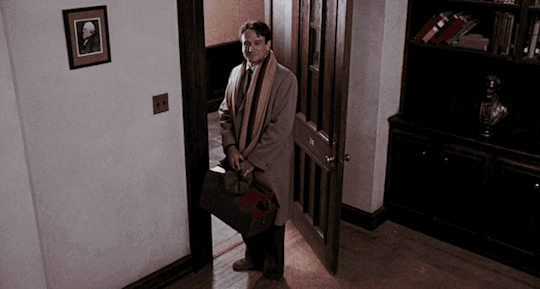

ESE: 120/100
50 +5 for young Ethan Hawke +10 for Robin Williams +4 for the alternative four pillars: Travesty. Horror. Decadence. Excrement. +5 for Kurtwood Smith -10 for Neil’s father, Mr. Perry +5 for Keating walking straight out of the classroom on day 1 +5 for Carpe Diem +5 for Keating instructing the boys to rip the shitty introduction to poetry out of the book +2 for Keating’s whistling -5 for Cameron being a little wussy boy +2 for “rude squeak” +2 for sneaking out to read poetry +10 for the centerfold with poem written on the back +10 for the Congo creeping through the black, cutting through the forest with the golden track -10 for calling Todd out in front of the class +5 for the bed chase that finally gets Todd involved +5 for Neil getting the part of Puck in Midsummer Night’s Dream -10 for students like Hopkins +15 for Keating helping Todd to find his voice +5 for saxophone -10 for the same desk set -5 for bringing the two girls to the DPS meeting -5 for kissing the forehead of a girl you barely know while she’s asleep -10 for the over-reaction of Chet -10 for corporal punishment +10 for “Nuwanda” not breaking -10 for Neil’s super-unreasonable father +15 for Keating’s advice to Neil -5 for Knox’s persistence -5 for Neil lying to Keating about talking to his father +10 for Neil’s performance as Puck +5 for the amount of praise Neil receives for his performance +10 for Keating’s concern -10 for suicide aftermath -15 for Cameron being a fucking fink +20 for Nuwanda (Charlie) punching Cameron in his stupid face -10 for the school using Keating as a scapegoat +20 for Todd’s show of appreciation and those who joined in solidarity on their desks +10 for Hopkins joining and standing on his desk, too
#Dead Poets Society#80s movies#80s films#Robin Williams#Ethan Hawke#Robert Sean Leonard#Kurtwood Smith#Melora Walters#Josh Charles#Gale Hansen#Dylan Kussman#Allelon Ruggiero#James Waterston#Norman Lloyd#comedy#drama#tragedy#english major#poetry#films#movies#world record#review
68 notes
·
View notes
Text
‘Tortured Beyond Recognition’: Muslim Persecution of Christians, December 2020

Christians executed by jihadis on Christmas Day in Nigeria.
by Raymond Ibrahim
The following are among the abuses inflicted on Christians by Muslims throughout the month of December, 2020:
The Slaughter of Christians
Nigeria: In a video that appeared on Dec. 29, Islamic terrorists executed five Christians. The footage showed five armed members of the Islamic State (West African province) standing behind five men dressed in orange suits with their arms tied behind their backs and on their knees. The terrorists order each of the men to say their names and the hostages oblige, each adding, “I am a Christian.” One of the terrorists then says “This is a warning to Christians in all parts of the world and those in Nigeria…. Use the heads of these five of your brethren to continue with your ungodly celebrations,” a reference to Christmas. The five Muslims then open fire into the back of the Christians’ heads and kill them.
A few days earlier, on Christmas Eve, and for several hours into the early morning of Christmas Day, Muslim raiders terrorized a Christian village, where they slaughtered between seven and 11 people, including a 5-year-old, and kidnapped 11 more (it is believed that the five Christians who were executed on video were from among these 11). Riding on trucks and motorcycles, the jihadis opened fire indiscriminately, torched 10 homes and one church, and plundered the food supplies meant to be distributed on Christmas Day. Although traumatized, some Christians remained defiant, as captured by a Christmas Day text by one Markus Bulus, a local:
Whatever Boko Haram planned against us has failed. Whatever it is, we shall still celebrate Christmas. Jesus, we’re so grateful this day even with the bad experience we had last night. We have nothing to offer as our thanksgiving, but we offer our hearts in deep supplication to your majesty on this Christmas Day.
Elsewhere throughout the month of December, Muslim Fulani herdsmen “killed 33 Christians, destroyed 18 homes and displaced more than 2,500 people.” Moreover, according to a report released by the International Society for Civil Liberties & the Rule of Law (“INTERSOCIETY”), Muslims have massacred at least 2,200 Nigerian Christians between Jan. 2020 and Dec. 13, 2020. Of this figure, “Jihadist Fulani Herdsmen,” it said, were responsible for about “1,300 Christian deaths, followed by Boko Haram and its splinter groups (ISWAP and Ansaru) with 500 Christian deaths…. In other words, Nigeria in 2020 has lost average of six Christians per day and 180 per month.”
Uganda: A Muslim mob attacked and killed a man “a few days after he renounced Islam to follow Christ.” On Nov. 30, Yusuf Kintu, 41, then an imam at a mosque, converted to Christianity. “We had been talking on several occasions,” Pastor Andrew Nyanma explained, “but he was so argumentative when we touched on matters related to faith. He was a brilliant Muslim Imam but also respected other people’s faith. On this day [of his conversion], he was calm and receptive.” Three days later, his wife divorced him and left the house with his two youngest children. On Dec. 6, one week after his conversion—or, in Muslim eyes, apostasy—an angry Muslim mob rose up against him. According to one source, “the local Muslim community was upset in [sic] Yusuf for leaving Islam and becoming a Christian. Yusuf was seriously beaten and left unconscious.” Pastor Andrew found him in the morning and took him to a hospital, where Yusuf succumbed to his injuries on Dec. 7.
Egypt: On Dec. 10, two Muslim brothers went on a stabbing spree targeting Christians in Alexandria; one man was killed and two others were severely injured and hospitalized. According to authorities, they went on their murderous rampage because they were “upset” that their mother had died earlier that day. “The matter began with insults and curses to the shopkeepers for being Christians,” explained Fr. Michael Gamil, whose nearby church was also targeted. “The Copts present responded with patience. Then, when one of them, Ramses, quietly went to close and lock his shop door, they lunged at and stabbed him with knives.” Ramses’ brother, who ran a grocery store nearby, saw what was happening, rushed to his brother’s aid, and was also stabbed. The Muslim brothers then barged into the clothing shop of another Christian man and stabbed him in the torso, near his heart. All three men were hospitalized with serious injuries in intensive care; Ramses died of his wounds. The rampaging Muslim brothers then entered Fr. Michael’s church and cursed at a partially blind priest. Discussing the alleged motive, Fr. Michael said: “They [Egyptian authorities] say they started cursing the Copts because their mother died; and two years earlier, they cursed the Copts because their brother died: what do [familial] death and the Copts have to do with each other?” He emphasized that the two brothers had been in the habit of verbally harassing and insulting Christians for years—though they clearly took their hate to another level on Dec. 10.
Artsakh: Muslim fighters tortured a 58-year-old Christian woman of Armenian descent by hacking off her ears, hands, and feet, before finally executing her. According to the Jan. 14 report,
On the same day of talks between Erdogan and Putin, when Turkey’s leader said he would like to create conditions of ‘coexistence’ between Armenians and Azeris, officials located the body of an Armenian woman today who had been reported missing.
The woman has been identified as 58-year-old Alvard Tovmasyan who was a resident of Karin Tak village, near the Shushi region of Artsakh currently occupied by Azerbaijani forces.
Tovmasyan was a second degree intellectually disabled person killed and ‘tortured beyond recognition’ outside of her home with her hands, ears, and feet cut off, according to her brother Samvel Tovmasyan who confirmed her identity by recognizing the clothes she was wearing.
As to why she was mutilated before being killed, jihadis often cite the Koran’s calls to cut off the hands, feet, and throats of infidels (e.g., Koran 5:33, 47:4).
According to a separate Dec. 15 Church Militant news report, “Armenians are being brutalized” and have “lost territory to their jihadist neighbors before agreeing to a cease-fire enforced by Russia…. Prior to violating the so-called peace agreement, the Turkish Muslims of Azerbaijan did as Muhammad commanded in beheading Christians.” The report linked to a video of camouflaged soldiers overpowering and forcing down a struggling, elderly Armenian man, and then casually carving at his throat with a knife: “Azerbaijan has accused Armenia of violating the peace deal first,” the report continues, “but observers note the only provocation Muslims need to attack Armenians is their continued existence.”
Democratic Republic of Congo: Members of the Allied Democratic Forces, widely acknowledged as “an insurgent jihadist group,” slaughtered at least 30 Christians and raped ten women and girls in five villages between Nov. 20 and Dec. 3. One of the survivors, Tony Longi, managed to escape his home in time and hide in the outside bathroom: “through the ventilator of the latrine he saw the rebels killing 4 members of his family including his wife and 3 children.” According to one local official, “We got information that as they killed the Christians the[y] were saying that they were killing them because they refused to convert to Islam.” Another report describing these raids said there were “scenes of terrified Christians flooding into the streets as the jihadists surrounded churches in each of the five villages armed with guns, machetes, clubs, swords and axes.”
Attacks on Muslim Converts and Christian Preachers
Uganda: A Muslim man beat and forced his wife to drink pesticide on learning that she had become Christian. Three months after Zubeda Nabirye, a 38-year-old mother of three, had secretly converted, her husband discovered Bibles in her possession and demanded if she had apostatized. She told him that “a friend had given me the Bibles, and I was using it to compare it with what is written in the Koran, and after all religion is a matter of personal choice”; she added that “I was convicted and decided to embrace Christianity.” In response, “My husband began reading verses in the Koran that allowed men to beat their wives if they disobey them, and after that he started beating me with slaps and sticks. As if this was not enough, he forced me to take Dithane M-45,” a toxic pesticide. He forced the poison into his wife’s mouth; though she managed not to swallow most of it, she “ingested some while he was trying to strangle her and hitting her leg with sticks… He also injured her chest, neck and thigh.” It was late in the night when “I regained consciousness and found myself surrounded by neighbors.” One of them later explained that “we heard groaning from a nearby banana plant, and there we found Zubeda Nabirye, who had just regained her consciousness but with vomit and blood all over her body.” They took her to a nearby hospital. According to the Dec. 17 report, “she suspects her husband took her to the banana plants expecting she would die there.” Even so, she did “not file charges with police over the assault as it could provoke further violence. She still looks very weak and asks about the wellbeing of her three children,” who at the time were staying with her husband’s mother due to COVID-19 travel restrictions: “I am worried about my children [aged 9, 13, and 16], who are under the care of my mother-in-law,” Zubeda said. “I know it will be very difficult for me to see them and reunite with them.”
In a separate incident in Uganda, on Dec. 21, Muslims gang-raped a female church pastor. The widowed mother of five was walking home from Christmas preparations at her church when she heard someone crying for help in the dark. “When I stopped,” explained the 50-year-old whose name is withheld for security reasons, “I was surprised to see people coming from the bush, and one of them shouted in the Arabic language, ‘Allah is greater—we have warned you several times to stop converting Muslims to Christianity. Today we shall teach you a lesson that you will not forget.’” One of the men covered her mouth with a chemical-doused handkerchief that caused her to lose consciousness. She awoke three hours later and was found by her nephew. “He saw blood on my torn skirt. He could not stop tears rolling from his cheeks, crying and shouting for help, and he took me to a nearby clinic for medical treatment.” Two months earlier, a Muslim neighbor had complained to her: “I am warning you not to come to our home. My children are now singing some Christian songs. I know soon they will come to your church. We as Muslims have no relations with infidels.” A church member said the rape victim remains traumatized: “Sometimes she is quiet for about one hour; … she is having severe headache[s], swelling at her neck and severe pain in her private parts.” “I am hurt,” confirmed the visibly emotional and tearful pastor from her hospital bed during an interview on Christmas Eve. “I will miss Christmas celebration with my church members…. I hope these Muslim rapists have not infected me with deadly diseases. I forgive them,” added the mother of five who was widowed five years earlier.
Attacks on Churches
Pakistan: On Christmas day, a mob consisting of as many as 60 Muslim men attacked a church during Christmas service. According to the Dec. 30 report, “They aimed to kidnap and assault the women in attendance.” However, the church’s security guards and male congregants “fought back with bare hands against the staff-wielding intruders, giving the women time to escape. Many Christian men suffered blunt trauma injuries and fractures in the fight.” Before things got violent, the Muslim invaders had made derogatory comments about the Christian women, adding that they were “looking dashing today. Let us have all of them in our beds.” When one of the Christian defenders angrily rose up, “The Muslims,” he said, “warned me never to stop them from doing whatever they wanted to do with Christian girls.” On arriving, the authorities “helped the defeated Muslims escape, and blamed Christians for fighting back.” According to a spokesman for the Christians,
They scolded and threatened the Christian community, the Christian church, saying it’s illegal to have their own security. Which is truly an unjustified and illegal action by the police, because it was announced by the government of Pakistan two years ago, that every church must have its own security. They must have their own CCTV cameras, barbed wires, and medical equipment.
Sudan: A temporary church structure of the Sudanese Church of Christ has been burned down five times by what one pastor described as “radical Muslims.” They also threatened to butcher the Christians if they dared erect another tent again. According to the Dec. 22 report, “Saying they didn’t want a Christian presence in the area, the extremists have burned down the structures on Jan. 19, 2019, and this year on Jan. 4, Jan. 19, Jan. 28, and Aug. 7…. The church decided to report the attacks to police after the Aug. 7 arson in spite of the threats.” The original church building, which had been in operation since 1993, was first torched in 2019; since then the 150-member congregation have been setting up and worshipping inside tents, though all five have been “reduced to ashes along with Bibles and prayer books.” Church members identified several of the assailants. Police initially refused to file a case until an attorney got involved. Five of nine suspects involved have been arrested.
Discrimination, Misogyny, and Violence against Christians
Egypt: In what human rights activists described as an “egregious miscarriage of justice,” a court acquitted three Muslim men charged with assaulting a Christian grandmother, including by spitting on and beating her, stripping her naked and parading her in the streets of their village, on the accusation that her son was romantically involved with a Muslim woman. Although this attack took place in 2016, and although video evidence and witnesses have identified the three Muslim men, the Egyptian courts refused to render a decision. As a Dec. 21 press release from Coptic Solidarity explains:
After multiple delay tactics, including judges ‘recusing’ themselves and retrials by different court circuits, the case reached this sad conclusion. The Egyptian judiciary has revealed their true face of Islamist fanaticism and blatant bias against Coptic victims. This is indeed shameful for a country that has employed some form of a ‘modern’ justice system for 150 years.
Upon hearing news of the court ruling, Mrs. Thabet [the victim], burst into tears, simply saying “What shall I do after being so humiliated! My right is in the hands of my Lord who shall render me His justice.”
Pakistan/China: Christian and Hindu women in Pakistan are being marketed to China as concubines and forced brides, a Dec. 9 report revealed. Due to China’s longstanding one-child only policy and cultural preference for boys, the nation suffers from an acute shortage of females, causing Chinese men to import women from abroad. Speaking on Dec. 8, the top U.S. diplomat for religious freedom, Samuel Brownback, said that “religious minorities, Christian and Hindu women” from Pakistan are “being marketed as concubines and as forced as brides [sic] into China.” This is because “there’s discrimination against religious minorities that make them more vulnerable” in Muslim Pakistan, he added.
France: “Handwritten letters were mailed to seven black African priests with their names and the address of the rectory where they live,” reported the Vicar General of the Diocese of Avignon Pascal Molemb Emock: “The mail only says ‘Allah Akbar’ in French and in Arabic.” Because violent Islamic attacks on clergymen and Christians in general have been escalating in France—five weeks earlier a Muslim man crying “Allahu Akbar” entered a church and slaughtered three Christians in Nice—an investigation was quickly opened. As a police source explained on Dec. 9, “These are not direct death threats, but in the context of a terrorist threat, this matter is taken very seriously.” “I am not afraid for myself,” commented one of the priests. “I will continue to live alone in my rectory. But I am responsible for a community, I must be careful for the parishioners.”
Iraq: At least 14 shops that sell alcohol in Baghdad—most of which are owned by Christians—were firebombed throughout November and December. According to the Dec. 16 report, these escalating attacks have “terrified shop-owners who fear hardline Islamists are flexing their muscle against alcohol consumption.” Discussing the situation, Andre, an Iraqi Christian, said the recent bombing of his shop has cost him thousands of dollars in repairs. “These groups want the last of the Christians to leave the country,” he said of the attackers: “They’re targeting us.” He also blamed security forces for leaving their post for hours, thereby providing the attackers with “time to place the explosives, take pictures before and after and publish them on Facebook.” “Why doesn’t the government arrest them?” he added, pointing out that he had even provided authorities with the license plate number of the attacking vehicle as captured by the store’s surveillance camera.
Christmastime Terror
Spain: On Christmas day, a Muslim of Moroccan background, known only as Muhammad Q., stalked through a Christmas street celebration while brandishing a machete and crying out, “Allahu akbar, I’m going to kill you,” at random passersby. He lunged at police when they arrived and slightly injured them, though they managed to subdue and arrest him. Subsequent investigations revealed that the 45-year-old had a criminal record relating to the sexual abuse of a minor and ties to the Islamic State.
France: A group of Muslims thrashed another Muslim for participating in a Christmas Day dinner. After Nabil, 20, published pictures of the dinner online, a schoolmate expressed his “shock” via text that a fellow Muslim would celebrate Christmas, at one point texting, “I’ll show you what a real Arab is.” Nabil and his scandalized Muslim schoolmate then agreed to meet and discuss the matter; but when Nabil arrived, the schoolmate and four other men ambushed and beat him, leaving him with a bloodied and bruised face and a warning not to report the incident to police or else. Undeterred, he contacted local authorities who subsequently arrested the schoolmate. During his trial, he continued to assert his “shock” that Nabil had posted such pictures, adding “It is not Muslim to celebrate Christmas.”
Western Europe: Some Christians celebrated Christmas under threat in a few nations: According to a Dec. 3 report, British intelligence, relying on a former al-Qaeda bomb-maker, warned that “a senior Isis commander is plotting a Christmas terror campaign in European countries, including Britain.” The Muslim terrorists had reportedly “decided to try and use the lifting of lockdown restrictions during the Christmas period to launch attacks in Europe, in particular against the UK, France and Germany.”
Germany: In a video that appears embedded in a Dec. 19 article, a Muslim cleric living in Braunschweig declares that “Christmas is an insult to Allah”
About this Series
The persecution of Christians in the Islamic world has become endemic. Accordingly, “Muslim Persecution of Christians” was developed in 2011 to collate some—by no means all—of the instances of persecution that occur or are reported each month. It serves two purposes:
1) To document that which the mainstream media does not: the habitual, if not chronic, persecution of Christians.
2) To show that such persecution is not “random,” but systematic and interrelated—that it is rooted in a worldview inspired by Islamic Sharia.
Accordingly, whatever the anecdote of persecution, it typically fits under a specific theme, including hatred for churches and other Christian symbols; apostasy, blasphemy, and proselytism laws that criminalize and sometimes punish with death those who “offend” Islam; sexual abuse of Christian women; forced conversions to Islam; theft and plunder in lieu of jizya (financial tribute expected from non-Muslims); overall expectations for Christians to behave like cowed dhimmis, or second-class, “tolerated” citizens; and simple violence and murder. Sometimes it is a combination thereof.
Because these accounts of persecution span different ethnicities, languages, and locales—from Morocco in the West, to Indonesia in the East—it should be clear that one thing alone binds them: Islam—whether the strict application of Islamic Sharia law, or the supremacist culture born of it.
Previous Reports - monthly back to 2011
14 notes
·
View notes
Photo

“Berliner Fernsehturm” * Foto: BernardoUPloud
After her marriage with Frank Randall has failed and Claire Beauchamp flees from her violent husband, she finds refuge in the house of the Fraser/Murray family in Berlin-Wilhelmshorst. But then tensions arise between Britain (which has since left the EU) and some EU member states. All holders of an English passport are required to leave EU territory within six weeks … and suddenly Claire’s fate looks more uncertain than ever.
This story was written for the #14DaysofOutlander event, hosted by @scotsmanandsassenach

Chapter 5: 14 Seconds (3)
They had stayed like that for a while - Jamie kneeling in front of Claire, one arm around her and Claire, crying while clutching that arm. When they had separated, Jamie had stood up. He had stepped up to the minibar hidden behind a small cupboard door. There he had emptied four small whisky bottles into two glasses and handed one of these glasses to Claire. At the end of that evening they did not speak much to each other. Claire asked at some point if he could lend her a T-shirt. Since all his T-shirts were sweaty from sports, he gave her one of the shirts that the room service had brought back from the cleaners that morning. She disappeared into the bathroom with it. Meanwhile, Jamie sat down at the small desk next to the sofa that had been folded out to form a bed and opened his laptop. Then Etienne Marcel de Provac Alexandre began writing an email to the management of "In Vino Veritas" ordering a bottle of champagne for a friend's wedding and asking that the Magnum bottle be delivered as soon as he returned. Jamie knew that there would be someone sitting in the basement of the In Vino Veritas office building who would understand this "order" perfectly. The "special office" (as they called it), which was hidden behind an easily movable wall of shelves full of exquisite wine bottles, was manned 24 hours a day, 365 days a year. Between four and ten "employees" of the wine shop took care of the very special "orders" that arrived there from time to time from all over the world. Jamie also knew that people in the cellar of "In Vino Veritas" would not be happy about this "order". But there was no question that they would do anything to fulfill his "wish".

“Weinkeller” by designermikele
After he had pressed "Send", Jamie stretched his arms and legs. Then he considered whether he should let Claire in on his plans that very night, but decided to let her sleep for now.
Shortly afterwards, Claire came out of the bathroom. Out of the corner of his right eye, Jamie saw that she was wearing the big white hotel robe. She disappeared immediately behind the bamboo screen.
"The bathroom is free now," she shouted.
"Thank you, I'll be going now," he returned. Then he took his pyjamas out of his suitcase and went to the bathroom.
When Jamie came back a quarter of an hour later, also wrapped in a hotel bathrobe, there was still a light burning behind the bamboo screen. He lowered himself onto the sofa bed and thought for a moment. Then he turned out the light.
"Good night, Claire."
"Good night, Etienne."
Now the light behind the screen went out.
Jamie wondered if Claire would be able to sleep that night. He hoped so. Whether he would sleep at all was doubtful to him. Again and again he played out in his mind the plan he had already made during dinner. He was not sure if Claire would accept his suggestion. But he had to try, at least.
At 5.20 am, Jamie was awakened by the pressure of his bladder. He turned off his smartphone alarm clock, which would ring ten minutes later. Then he went quietly into the bathroom. When he returned, he had put on his sports clothes. He quickly wrote a short message for Claire on a Post-It sticker he put on the bathroom door. Then he quietly left the room.
At 6.40 am Jamie returned from the gym. Carefully he opened the door of the hotel room. But everything inside was still dark. He stopped for a moment and listened. From the area behind the bamboo paravent a slight snoring could be heard. Jamie had to smile. He took his clothes, removed the Post-It sticker from the bathroom door and went inside.
When he came back into the room just after 7:00 am., Claire was sitting in one of the chairs. She had both legs hanging over the armrest and was drinking in bulk from a water bottle that Jamie had taken from the mini-bar the night before and put on the table. When she had put the bottle down, she yawned heartily and stretched her arms away from her. Only now did she notice Jamie. She flinched briefly and pulled her legs from the armrest.
"Oh! Excuse me!"
Jamie smiled.
"There's no need to apologize. Good morning, Claire. Did you get … some … sleep?"
She looked at him and for the first time since he'd met her, a radiant smile went over her face.
"I didn't actually think I could sleep," she said, "but I must have fallen asleep at some point, When I woke up, I heard the shower and I was extremely thirsty."
"I'm glad you did. Are you, uh ... hungry too?"
"Not at the moment, but after a shower I could certainly use a strong coffee and something to eat."
"Good. I'll call the room service.”
"Thank you.”
“You're welcome.”
She got up and went past him into the bathroom. Jamie had to force himself not to look at her. Why should such a beautiful woman apologize for her stunning legs, he thought, grinning like a honey cake man. Then he felt the blush shoot into his face. He picked up the receiver of the room telephone and ordered breakfast.

“Frühstück” by contatoartpix
It took Claire almost forty minutes in the bathroom and that could only be right for Jamie. When she came back, he had cleaned up a bit and packed his suitcase. Then the room service rang and brought breakfast. After Claire spread the food out on the small table and Jamie poured coffee into their cups, they started eating in silence. Jamie waited until Claire had had her first cup of coffee. As she finished her first croissant and turned to the scrambled eggs, he thought the time had come to let her in on his plan.
"Have you thought about," he asked cautiously, "what are you going to do now?"
Claire didn't answer, but Jamie saw her face darken slightly. He knew that this question had thrown her back into the very reality she so eagerly wanted to escape from. But he could not spare her that now. She took a deep breath, then she said:
"No, I haven't done that yet."
"Do you have any obligations?"
"What do you mean?"
"Well, professional, maybe? A job where they are waiting for you?"
"No, I don't."
Again she was silent and Jamie decided not to pursue this topic further because Claire seemed uncomfortable with it.
"Are there any friends that you could stay with for a while?"
Jamie knew that question was dangerous. Claire could say ‘yes’ and then turning down the offer he wanted to make. Still, he chose to ask about it. He wanted to avoid any appearance that he was pushing her on anything.
But his concern was unfounded. Claire looked down.
"No, my best friend ... married an Australian doctor six months ago who's gone back to his home country. She ... now lives in Canberra. And ... another friend of mine ... flew to the Congo last week - with his wife. They're doctors, and ..."
"The Democratic Republic of Congo? The recent Ebola outbreak?"
"Yes, they're helping the local doctors ..."
"I see. And there's no one else?"
"Well, there are people I know, but I wouldn't confide in.”
Jamie nodded.
"Claire, if you have no work commitments here and no friends to stay with, I have a suggestion ..."
"What kind of suggestion?"
"Well, how about a vacation?"
Claire had to laugh out loud.
"A vacation?" she asked incredulously.
"Yes. What would you say if I invited you on a holiday to Germany? I know this is going to sound crazy to you. but it really wouldn't be a problem. My family has a big house, you'd have your own big room with a bathroom. My sister would take care of everything. There are forests and lakes nearby ... very close. You could see Berlin, Potsdam, Dresden ... if you like. Maybe together with my sister and the children. Whatever you like ... In any case, you could keep your distance from the ... situation here and ... you could decide what you want to do in the future on your own time."

“Schloss Rheinsberg” by 70650
He was silent. Even Claire could not utter a word out of astonishment.
"But how can this ...?"
"Don't worry about that. I'll take care of it. I just need to know if you want me to. And I assure you, if you don't like it in Berlin, I will get you a ticket back here. You don't have to worry about that or the cost.”
"But ...”
"No buts. Yes or no?"
Claire couldn't believe it. Was this a dream or reality? Last night she had asked him how far Berlin was from here. 6,000 kilometres he said. What a distance. 6,000 kilometers between her and the monster who still called himself her "husband" ...
"Do you ... honestly mean that?"
"Yes, Claire. And I have no ulterior motives. If it makes you feel any better, I have to work during the week and so I'm usually not home. So during the day, you'll be dealing mostly with my sister, the kids and staff. And that's only if you want it. You are completely free to do whatever you want."
Again her mind was spinning. Could she really trust this man. He had not approached her that night. But would he maintain this restraint if she flew with him to another, a foreign country? But maybe he really only wanted to help her?
"You ... said you were flying back to Berlin tonight ... “
"Yes, that's true, but if we hurry, I can still fix all this. Will you come with me?"
Did she have a choice? Did she have an alternative? Traveling, discovering another country, meeting new people. All that had determined her childhood and youth, the time she had spent at the side of her beloved uncle Lamberth. And how much she had missed it all. While she thought of uncle Lamb, a verse from a children's opera she had attended with him more than two decades ago suddenly flashed through her mind. It was the well-known last verse from Humperdinck's 'Hansel and Gretel' - 'When adversity rises to its highest, the Lord God puts out His hand to us!’ Without noticing it, Claire hummed the melody softly to herself.
Jamie, still waiting for an answer, looked at her in wonder.
"Claire? Yes or no?"
"Yes," she replied, and her voice had regained a firmness that had been one of her defining characteristics long after she had finished medical school.
"Yes," she said again, adding, "I'm coming with you to Berlin."
Jamie's heart was beating faster. Until now he had hardly dared to hope that she would accept his suggestion. And yet it had happened.
"All right, I'll make the arrangements. Do you have your passport with you?"
"Sure, in my handbag. But don't I need a visa?"
"Yes. I'll arrange it. You don't have to worry about that.”
Jamie had got up and went to his laptop, which was still on his desk. The night before, he'd prepared an email for this case. Now he sent it. In this new mail, Etienne Marcel de Provac Alexandre asked that the bottle of champagne he had ordered be accompanied by a greeting card.
After that was done, Jamie sat down at the table with Claire again.

“British Passport” by Gustave.iii - via WikimediaCommons
"Claire, is it far to ... your apartment and will ... your ... husband ... be home?"
"No, it's not far, maybe 25, 30 minutes by car. I suppose that ... Frank will be at the university by this afternoon ..."
"Okay, then please write your address on this piece of paper and give me your passport."
She did what he asked.
"Thank you. Eat some more. We'll have to leave soon to get your things. I don't know if we'll have time to have lunch."
She nodded.
About half an hour later there was a knock at the door and a voice called out:
"Room service."
Claire looked at Jamie in amazement, but he just nodded. He put her passport and the note with her address on a plate and spread a napkin over it. Then he went to the door. Claire looked after him and watched as he handed the plate to a waiter. When Jamie returned to the room, he saw her amazed look.
"Please don't worry. Trust me. I'll explain everything to you ater."
Claire gave a slight sigh.
"I guess that's the price I have to pay for this adventure," she said, and put cheese on another croissant before wrapping it in a paper napkin and putting it in her handbag.
An hour later, after Jamie had checked out and paid her bills, they were back in the hotel limousine and had Carl drive them to Claire's address.

“Boston” by thefastandthefanagle Once there, Claire carefully opened the front door with her key. To her great relief, Frank was nowhere to be seen. Jamie heard Claire exhale freely. He looked around and a chill ran through him. Everything he saw was old, but not in any antique sense. Jamie had a thing for tasteful, antique furniture. But the decor did not have the taste or warmth of an old place. It almost seemed as if it had been furnished in a pragmatic way in the 50's and then forgotten until now. Everything here seemed purely functional, impersonal and cold. It was a furnished apartment, but definitely not a home.
"Claire, we have to hurry. Where are your things?"
She pointed up and he followed her up the stairs. When she reached the first floor, she stopped in front of a door for a moment. Then she pushed it open and went inside. Jamie, who followed her, saw that it must be the Randalls' bedroom. But there was no marriage bed. There were two single beds on the right and left side of the room. To his surprise, the sheets were scattered all over the beds. And … there were bloodstains on one sheet. He did not dare to imagine at that moment what had happened here. Now it was time to keep a clear mind, use the time and then get Claire safely out of this danger zone. Afterwards there was still enough time to let his anger about these things run free. When he was back home in Wilhelmshorst, he could maltreat the sandbag in his fitness room with his fists for as long as he wanted. But now ... Then he noticed how Claire had put some suitcases on one of the beds and was now busy packing clothes into them.
"Claire, when you've packed all your clothes, please pack everything else that you care about. Documents, books, whatever belongs to you."
She just nodded and put more things in the suitcases. When she had filled three large suitcases, the wardrobe was empty. Jamie carried the suitcases down the stairs and put them down near the front door. When he returned to Claire, she had another smaller suitcase and a backpack filled with documents and other things.
"Is that all?"
"That's all I can take with me in suitcases."
"Is there anything else that belongs to you and that we should keep safe?"

“Box” by bluebudgie
"There are several boxes in the cellar with things my uncle Lamberth left me, but we'll hardly be able to take them on the plane."
"Don't worry. We'll get them on another way to Berlin. I'll take care of that."
Slowly they went down the stairs. But before they got to the last step, they heard someone unlock the front door and enter the house. Jamie saw him first. An obviously drunk Frank Randall staggered towards him and, seeing the strange man, began to scream:
"What are you doing in my house?"
A tremendous rush of adrenaline shot through Jamie's body, followed by a rush of rage. He could barely contain himself. He knew it couldn't be. The man he now faced could not be the demon he had fought with years ago in a prison cellar in Edinburgh and to whom he owed scars that would remind him all his life of the time he spent in that dark vault. Jamie's mind told him that Jack Randall, better known as 'Black Jack', was dead. But Frank Randall looked so much like him and it cost James Fraser all the strength he could muster at that moment or he would have forgotten himself.
But then Frank Randall noticed Claire next to Jamie.
"You slut, you whore! I knew it! I kneeew it! You're whooooring around with a muscleman, but you're not gonna let meeee have a little funnn with women who are nicer than you everrrrrrrr were. You frigid, cold bitch, you ..."
He had raised his right arm and was now trying to punch Claire. But before she could duck, Jamie had grabbed Frank's arm and turned it onto his back. The drunk cried out in pain. Jamie let go of him and gave him a gentle nudge. Frank landed, face down, lengthwise on a yellowish sofa. A light cloud of dust rose above him. Claire looked at Jamie in shock.
"Is he...?"
"No," he assured her, "he's not dead. He's just dead drunk and will sleep it off in the next few hours. Before we leave, I'll turn him over."
Suddenly the front doorbell rang.
Claire looked at him again.
"Open the front door, Claire. The men will get your bags."
"The men?"
"I'll explain later. Go and open. Now, Claire! I'll keep ... an eye on Frank."
She had a million questions, but Claire decided to just go for it. When she opened the front door, there were five men in overalls that looked like they'd come from a moving company.
"Mrs Randall's suitcases?" asked a tall man who reminded her of an actor from and who was obviously the boss of this group.
"Here you go."
Claire pointed to the suitcases and two other muscular men stepped in, took the suitcases and carried them to a black van with "New Castle Movers" written on it.
"Is there anything else that needs transporting?" asked the boss of the troupe.
"Yes, down in the basement. I'll show you."
The man waved at the remaining two men and together they followed Claire into the basement.

“Bellhops loading a truck“ by Bellhopsmarketing - Own work, CC BY-SA 4.0, https://commons.wikimedia.org/w/index.php?curid=75018108
Thirty minutes later, the men had loaded Claire Elizabeth Beauchamp Randall's entire belongings into the black van belonging to the “New Castle Movers” company. The boss of the troupe had briefly exchanged a few words with Etienne Marcel de Provac Alexandre, then they drove off. Claire would have loved to know who these men were and what they would do with her belongings. But then Frank started to stir again. Jamie turned the drunk man, who was mumbling incomprehensible things, onto his back. He tried to stand up and talked to Jamie. But he just looked at him and Frank sank back into the cushions of the sofa. Shortly afterwards he started snoring loudly. Claire could only shake her head. This nightmare had to end. She wanted to get out of here as soon as possible.
"Who were those men, Etienne? And what happens to my things?"
"They are friends of a friend. Your things will be on their way to Berlin in a few hours ... on a cargo plane. They'll probably arrive a day or two after we do. Don't worry, my company will take care of it. Have you got everything now?"
Claire nodded.
"Good, then we'll go to the airport now."
He took her small case and the backpack and went to the door. Claire followed him. She was tempted to look back. But she did not. It had to end. It would end right here, right now. She pulled the front door behind her into lock. Then she pulled the front door key from her key ring and pushed it under the pot with the little buxus that stood on the top step of the stairs to the entrance. Jamie, who had stowed the hand luggage in the trunk, held the door of the car open for her. She got in and he took a seat next to her.
"To the airport, Mr. Alexandre?" asked the uniformed driver.
"Yes, Carl, straight to the airport."
#14DaysofOutlander#Outlander#Outlander Fan Fiction#From Boston to Berlin in 14 Hours#Claire Beauchamp#Jamie Fraser#Frank Randall#Black Jack Randall#Jenny Murray#Ian Murray#Berlin#Boston#Germany#Modern AU
68 notes
·
View notes
Text

Going back to a simpler, minimalistic look with the personal blog. Single Image, Single Video, allows for quicker sharing. Although, sharing a link is easy enough, sometimes having a simple visual to accompany the link is more than enough.
Below: "CONGO" - THE MAD MAGE FT. LOOSE TEKZ. (OPEN VERSES)
#the mad mage#blog update#unstoppable union thee empire#music#new jersey#multi-genre#hiphop#r&b#edm#rocknroll#LOOSE TEKZ#CONGO#NEW RELEASE
2 notes
·
View notes
Text
How To Plan A Safari To Africa?
There are a few key inquiries to, thoroughly consider when arranging your optimal safari occasion to Africa. The first is “The thing that would you truly like to do?” Not what you figure you should do, nor what your companions prescribe, however, the closest thing you can accomplish to your very own most out of this world fantasy of what you need from your African safari tours.

The considerations that need consideration
The other primary contemplations are your own prosperity, wellness, capacities and your accessible spending plan. Do you need Luxury, Deluxe or Budget-spending itinerary with reputed tour operators? Would you like to see the breathtaking hordes of the Serengeti and Masai Mara migrating wildebeests, zebras or mighty elephants of Chobe, Tarangire and Amboseli from a 4×4 game-review safari vehicle?
Would you like to take a gander at perfect wild or Grand River from a treehouse, a camp, the deck of a house-pontoon or a tourist balloon? Would you like to film, photo the Big Five in Tanzania’s NgorongoroCrateror South Africa’s Kruger NationalPark, or would you like to, just yet discerningly experience the dynamic, extraordinary environment of Botswana’s rich Okavango Delta or the UNESCO World Site Legacy wild of Lewa Conservancy in Laikipia cushioned around Mount Kenya.
Does your inclination reach out to chic voyages through Garden Route in the Eastern Cape or differing celebrations in Zanzibar or Cape Town? On the other hand, do you long to test yourself against the most testing territory on the planet? It can be from mountains and volcanoes like Kilimanjaro and OlDonyoLengai in northern Tanzania to burning the Namibian desert on the Skeleton Coast and scuba diving in the brilliant coral reefs of the Indian Ocean in Mafia, Pemba and Mombasa. Maybe your feeling of experience reaches out to bungee jumping at Victoria Falls in Zambia and Zimbabwe, whitewater boating on the Zambezi or even Uganda’s Nile, fly-camping along the Luangwa Stream in Zambia or Rufiji Waterway in Selous Tanzania finishing with trekking through challenging untamed woods overflowing with fire ants and vexes looking for imperiled Rwandan and Ugandan gorillas.

Vacation exercises of reputed tour operators can likewise stretch out to social or chronicled endeavors, which can be as enlightening as the ingrained instincts of a Kalahari bushman in Makgadikgadi, as moving as a Maasai wedding, function in the Mara. It can be as stunning as the fossil bones or impressions of ancient man in KoobiFora Turkana or Olduvai Crevasse or old cavern rock canvases in Botswana’s TsodiloHills, Matobo Hills and Diana’s Promise in Zimbabwe, and as tragic as remembrances of Rwandan destruction. You can even discover chances to chip in as an educator, a games coordinator, a specialist, a progressive, a humanist or an analyst at numerous goals in South Africa, Tanzania, Kenya, Malawi, Namibia or Zambia. You can do so on ventures as shifted as restoring panthers, checking birds, lion and rhino following undertakings, securing turtles and sharks and furthermore giving a hand to younger students living with their host families or orphanages.
Contingent upon the motivation behind your visit, your voyage through Africa can be will be determined by what you would like to see and experience A romantic honeymoon could be spent in Botswana, horse-riding in South Africa or at shoeless beach heaven by the Indian Ocean in Zanzibar, Mozambique, Seychelles, Maldives or Mauritius, or any combination of these destibations and that’s just the beginning. In the event that you are putting resources into an anniversary adventure, you should extend it to cover an assortment of goals and exercises during a similar wild outing. Whatever your fanciful idyll includes, reputed safari organizations have the skill and energy to make a consistent, bother free custom agenda to envelop any or the entirety of your most stunning travel dreams.
Where to Go On Safari In Africa
There are three unmistakable and darling zones to visit on your safari getaway with reputed tour operators. Though a great part of the natural life can seem comparative, there are incredible contrasts in immaculate verses created unsettled areas, untamed life or guest fixations, climate, landscape, perspectives and openings. Major Southern African safari goals incorporate the Kruger and Sabi Sand, Etosha, Sossusvlei, Okavango Delta, Chobe, South Luangwa, Lower Zambezi, Victoria Falls, Hwange, Mana Pools, Matobo Hills and so forth. Botswana and Zimbabwe bolster enormous crowds of up to 80% of Southern Africa’s populace of more than 300,000 elephants and Kruger – Sabi Sand is the Central Hub for the Big Five in South Africa.

Kenya and Tanzania are prime untamed life safari gems in East Africa, enveloping Lake Victoria, moving savannahs, the incomparable African Rift Valley, the Swahili coast and islands of the Indian Ocean. Here you will discover Mount Kilimanjaro and Mount Kenya, the Ngorongoro Crater, the Serengeti Plains, Selous, Tarangire, Masai Mara, Amboseli and the incredible pools of Manyara and Nakuru as the essential visited biological system. The yearly wildebeest migration sees a huge number of ungulates conquering floods, flames and starvation in the quest for crisp grazing between Tanzania’s Serengeti in the south and Kenya’s Masai Mara in the north. Other corresponding and occasionally the less dealt goals incorporate Katavi, Selous, Ruaha, Mahale, Laikipia, Samburu’s Northern Wilderness, Chyulu Hills – Tsavo and that is only the tip of the iceberg.
Rwanda and Uganda are most popular for gorilla and primate tracking safaris in Volcanoes and Bwindi Parks as a major aspect of the more noteworthy East Africa just like the Virunga National Park in the Democratic Republic of the Congo, which is a piece of Central Africa
The various zones offer various styles and experiences of the African safari experience.
Botswana has low sightseers apportion with “glamping” or camping spectacularly in extravagance tented confined venues in huge, untainted wild regions: the objective here is to give fewer quantities of advanced visitors paying more to have liberated access to enormous private conservancies for continuous and undisturbed natural life viewing experience which yields a profoundly valid encounter away from the majority. It leaves the experience unscripted as the manner in which nature would have proposed it to be.

Zambia, the final most stunning Africa, will, in general, be supported as a prepared returning safari nation for repeat guests who like to appreciate the final wild with strong quantities of natural life and birdlife populace in unblemished biology. One can experience exceptionally outdoorsy rural conditions – not for the timid when an elephant scrounges its trunk over the outside washroom during the long stretch of the October heat. One can have the “pleasure” of having restricted water fill late-night bucket shower after a bush supper in a flame lit zone of tent’s sandy floor may show a crawl or development however drives the prepared Africa voyager to be unflinching by the happenings and esteem it as being in the bramble.
The natural life involvement with Southern Africa is less dense than in East Africa as the spearheading untamed life goals where there are frequently more sightseers obliged in progressively populated lodgings in littler zones, for example, the Ngorongoro highlands or Masai Mara. Yet for those like to experrience it properly, there are still increasingly crude, valid wild regions open on private conservancies and parks in Laikipia, Ruaha, Selous and Katavi.
To what extent To Go on an African Safari
While ponderiung to what extent your safari will last, you have to think about how to get the ideal incentive from your excursion. As a rule, airfare to your destination in Africa costs when booked well ahead of time.
We suggest arranging the safari trip logistics effectively to abstain from backtracking to the first appearance point. Reputed tour operators can assist you with arranging and plot the logistics effectively. Obviously, on the off chance that you can bear the cost of an opportunity to visit a few parks in different nations, it is smarter to gather exercises in contiguous zones. For example, a visit to Victoria Falls in Zambia or Zimbabwe by the compelling Zambezi River combined with Chobe National Park and Okavango Delta in Botswana and completion with Kruger National Park in South Africa can amount to a superb safari!.
Make a northern circuit voyage through Tanzania with Tarangire, Lake Manyara, NgorongoroCrater and the Serengeti or essentially trail to Amboseli, Nakuru-Naivasha, Laikipia or Samburu and Masai Mara in mysterious Kenya can be well combined with a trip to see the mountain gorillas in Bwindi in Uganda or Volcanoes National Park in Rwanda. On the other hand, differentiate a particular encounter of the Skeleton Coast of Namibia with an excursion to Sossusvleiending with exploring the wonderful Etosha National Park.

Consider doing a safari of 12 – 14 days. There is such a great amount to choose – from horse-riding, ballooning and white-water rafting to pro bird watching, photography, angling, scuba diving, hiking and trekking…
It might be ideal to consolidate a thrilling encounter, for example, a wild safari in Sabi Sand in Kruger, with a restful voyage through South Africa’s Garden Route ending in Cape Town. Or end with a relaxing stay in Zanzibaer, after a safari in Kenya or Tanzania.
Photo Safaris will be pleased to recommend the best blend of goals for the traveling time that you have for a flawlessly great dream safari. Call 928.899.5917 to have a word with them and plan your trip to Africa after the pandemic of COVID 19.
1 note
·
View note
Text
Walt Whitman
Research Paper
Walt Whitman, considered to be one of America’s greatest poets, was born in New York on May 31, 1819. He was self-taught and became a printer at twelve years old and this helped him understand the written word and be familiar with the works of Shakespeare, Dante, and the Bible. Whitman wrote many prose and poems, though he is most known for Song of Myself from Leaves of Grass.
The first copy of Leaves of Grass was published in 1855 and he continued to revise it for the rest of his life. This book had many renditions with numerous poems ranging from 12 in the first publication and over 400 in the last. His poems are often characterized as having long lines, little to no rhyme scheme, reflection on nature, and repeating first words. Whitman used a number of poetic forms in his writings. In the essay, "Poetic Form as Meaning in Walt Whitman's Leaves of Grass," written by Nigel Fabb, the poetic forms used by Walt Whitman are observed. Fabb uses an excerpt from a poem in Leaves of Grass. He states, “… the following five lines which form a stanza of one of the component poems of the book, reproduced here as closely as possible to copy the layout (e.g., line-breaks) on page 67 of the first (1855) edition.
‘The sky continues beautiful…. the pleasure of men with women shall never be
sated.. nor the pleasure of women with men... nor the pleasure from poems;
The domestic joys, the daily housework or business, the building of houses - they
are not phantasms.. they have weight and form and location;
The farms and profits and crops.. the markets and wages and government…. they
also are not phantasms;
The difference between sin and goodness is no apparition;
The earth is not an echo... man and his life and all the things of his life are well-considered.’
Here we see various poetic forms. The most obvious is the line. Next, it has been argued that the poem is divided into ‘rhetorical groups.’ Third, there is parallelism between the parts. Fourth, there are small rhythmic sequences. In this section of the paper, I consider each of these in turn and argue that they are attributed rather than inherent. I conclude by commenting on the unusual line-internal punctuation, in particular two dots, four dots and a dash, which have relevance for the form of the text.” (Fabb 107-108) He goes on to use another example, “…most of Whitman’s lineation is attributed, though there are occasional examples of inherent lineation, as in the following example of lines written in iambic pentameter (Whitman 1881: 296):
‘Out from behind this bending rough-cut mask.
These lights and shades, this drama of the whole.’
Like all iambic pentameter lines, these lines are subject to subtle generalizations, which can loosely be summarized by saying that there are ten syllables in each line, and a stressed syllable within a polysyllabic word must be even-numbered.” (Fabb 109) This shows the numerous poetic devices that Walt Whitman used in his poems. These techniques were used by many poets that inspired and were inspired by Whitman.
Whitman was a part of the transcendentalism movement which was a literary movement that occurred in the early nineteenth century. Ralph Waldo Emerson was also hugely involved with this movement and the two poets are compared by Kelly Scott Franklin in the essay, “’Without Being Walt Whitman’: Vicente Huidobro, Whitman, And the Poetics of Sight.” Franklin writes, “Ralph Waldo Emerson (1836) described feeling ‘uplifted into infinite space’, which allowed him to see everything at once, and he described becoming a ‘transparent eyeball’ (Emerson, [1836] 1996: 10). Whitman himself would write in 1855, in what would later become ‘Song of Myself’:
My ties and ballasts leave me [. . .] I travel [. . .] I sail [. . .]
I skirt sierras [. . .] my palms cover continents,
I am afoot with my vision. (Whitman, 1855c: 36) (Franklin 285)
Franklin then goes on to compare Walt Whitman to Vicente Huidobro, who was a creationist poet, stating, “…both Whitman’s and Huidobro’s speakers can also see the ongoing exploration and travel of the globe. Whitman celebrates this exploration in a lengthy passage:
I behold the sail and steamships of the world, some in clusters in port, some on their
voyages,
Some double the cape of Storms, some cape Verde, others capes Guardafui, Bon, or
Bajadore,
Others Dondra head, others pass the straits of Sunda, others cape Lopatka, others
Behring’s straits [. . .]. (Whitman, 1982b: 290)
‘Others,’ Whitman’s speaker continues, ‘sternly push their way through the northern winter packs, / Others descend or ascend the Obi or the Lena, / Others the Niger or the Congo [. . .]’ (Whitman, 1982b: 290). But if the expansionist Whitman celebrates those who ‘sternly push their way’ into other lands, Huidobro’s speaker sees that same exploration in terms of the multiform violence of imperialism (Whitman, 1982b: 290):
“The bravest captains Captain Cook
On an iceberg went to the Poles Hunts the Northern Lights
To leave his pipe in the lips In the South Pole
Of Eskimos
Others stab fresh lances in the Congo
The heart of sunny Africa
Opens like pecked figs.” (Huidobro, 2003e: 494.69–75) (Franklin 287)
This quote shows the inspiration that Vincent Huidobro gained from Walt Whitman, despite the former being a creationist and the latter being a transcendentalist.
One of the most notable trends in Leaves of Grassis that of spirituality. In Ernest Smith’s essay, “’Restless Explorations’: Whitman’s Evolving Spiritual Vision in Leaves of Grass,” Smith explains the change in Walt Whitman’s spiritual image. He states, “In an uncollected manuscript fragment, Whitman terms spirituality “the unknown” (Leaves 612), and despite various pronouncements of certitude, especially in the 1855 and 1856 editions, as the poet more deeply engages his personal contradictions and his envisioned democracy’s various failures and compromises, his poetry comes to challenge its readers to conceive of spirituality more broadly, but less conclusively.” (Smith 229) This quote show that Whitman had a change in his thoughts of spirituality in Leaves of Grass. This is entirely understandable seeing as how he continued to add to and revise this great work for many decades until his death. It would only be natural to change his feelings and beliefs in some way. Smith continues by pointing out what Whitman’s earlier writings showed about the spirit by saying, “The personal pull of Whitman’s early poetry is undeniably powerful, a proclamation of the agency of the individual that at the same time invites us to “follow” the poet toward enlightenment, claiming deep insight into the nature of the soul.” (Smith 229) He then describes Whitman’s last poems, “While the major works of Whitman’s final productive decade demonstrate what Erkkila terms “a more traditional religious faith,” by the final arrangement of poems for the 1881 edition, the reader of Leaveswill move through poems supremely confident of immortality and a mystical oneness of humanity, other poems where the spiritual core of the text seems more based in phenomenology, Civil War poems that recognize the ability of death’s sheer physical carnage to at least momentarily eclipse spiritual hope, and the later meditative mode of poems such as those in the “Whispers of Heavenly Death” cluster.” (Smith 229-239) This accurately demonstrates the shift that occurred all throughout Whitman’s life to change the various aspects of how he reflected on spirituality in his poetry.
In addition to the use of religion and spirituality, Whitman also implemented numerous social issues into his poetry. This is outlined in the essay, “’Song of Myself’ and the Class Struggle in Language,” by Andrew Lawson. In this essay, Lawson notes, “Charles Hliot Norton, an early reviewer for Putnam's Monthly Magazine in September 1855, found Whitman's poetry monstrous in its ‘self-conceit,” its contempt for ‘all usual propriety of diction.’ For Norton, Whitman’s impropriety stemmed from his continual crossing of linguistic boundaries, by joining of the ‘gross’ with the ‘elevated,’ the ‘superficial’ with the ‘profound.’ An example would be the single line in which Whitman describes himself as both ‘one of the roughs,’ meaning, according to Webster, ‘rugged, disordered in appearance, coarse,’ and ‘a kosmos,’ an apparent invention of Whitman’s, meaning ‘a person who[se] scope of mind, or whose range in a particular science, includes all, the whole known universe.’” (Lawson 377) This shows one man’s view of Whitman’s poetry. Another is, “R O. Matthiessen, in American Renaissance (1941)… deplores Whitman’s ‘curious amalgamation of homely and simple usage with half-remembered terms he read once somewhere, and with casual inventions of the moment.’ Whitman's mixed diction is particularly irksome to Matthiessen because it smacks of the inauthentic; rather than using a ‘folk-speech,’ the language of the people. Whitman exhibits only the ‘happy pride of the half-educated in the learned term’ - he is using a language ‘not quite his own.’” (Lawson 377) Lawson then goes on to explain how opinions such as these about the poetry may also be influenced by social norms. He states, “For Norton, Whitman’s language is an unaccountable compound of class accents; for Matthiessen, Whitman is all too recognizably a lower-middle-class aspirant to the title litterateur, his choice of words marked by petit bourgeois pretension.” (Lawson 377-378) These quotes show the way some people felt about social classes in regards to literature and language.
Closely related to poetry, the use of music can be found in many of Walt Whitman’s poems, especially with Out of the Cradle Endlessly Rocking, a free verse, 32 stanza poem.An article that shows this is, “The Idea of Music in 'Out of the Cradle Endlessly Rocking,'” by William F. Mayhan. The article states, “By linking his poem so closely and specifically to music, Whitman offers a vital clue not only to the poem's unorthodox structure, but also to its meaning.” (Mayhan 113) The themes of this poem include the cycle of life, death, and rebirth. The poem itself is about a young boy who stands by the ocean and watches a couple of birds sing to each other. One day the female of the couple goes missing and the male tries to find her. He searches for his mate but can never find her and accepts that she has died. The symbolism of the musical structure of the poem highlights the song of the birds when they are together and the male singing alone. Mayhan explains this by saying, “…music plays not only a structural role, but also a symbolic one. …Whitman blends his experience of music (as heard) with his philosophical conceptions of the nature and meaning of music in a marriage of matter and form that is itself the essence of music.” (Mayhan 113) Understanding the musical form of the poem can help understand the meaning of it as well. It is important to note just how important music was to Whitman and is noted further in Mayhan’s article. He quotes, “He admits as much in his conversations with Horace Traubel, recorded later in his life:
‘My younger life was so saturated with the emotions, raptures, up-lifts, of such musical experiences that it would be surprising if all my future work had not been colored by them. A real musician running through Leaves of Grass-a philosopher musician-could put his finger on this and that anywhere in the text no doubt as indicating the activity and influences I have spoken of.’” (Mayhan 115)
This quote shows the importance that music held in his life and how it shaped his poetry. Again, the idea of music helps one to know and understand the meaning of the poem. This is further stated, “Layer upon layer of meaning begins to accumulate until, at the end, as we shall see, the effects of infinite interrelatedness (harmony) will affect not only the poem's structure, but will be, in itself, an embodiment of its meaning.” (Mayhan 122)
One of the many things that influenced Walt Whitman’s writing was the Civil War. This is discussed in the article, "Union and Disunion in 'Song of Myself'," by Herbert J.Levine. The article states, “One recent study has argued that the escalating crisis of the Union allowed Whitman to discover the healing role so central to "Song of Myself." Another has argued that the economic downturn of 1854, which put Whitman out of the housebuilding business, allowed him to discover his role as celebrator of the artisan…” (Levine 570). This shows the different thoughts others had about how the buildup of the Civil War may have influenced Whitman. Levine goes on to determine why Whitman wanted to unify the country, perhaps with his poetry. He states, “Where political rhetoric was failing to preserve the Union, poetry, Whitman saw, could attempt an alternative discourse of union based on the unity of a representative American self. With respect to such a unified self, the experience of his own body and soul, his land, its animals, people, occupations and history, the earth, its evolutionary past and cosmic future—all was to be portrayed as a vast seamless web, within which differences could be accommodated without dismembering the whole.” (Levine 576) This shows that Whitman wanted to keep the country whole and attempted to do so by writing poetry.
In conclusion, Walt Whitman is considered to be one of America’s great poets for a number of reasons, ranging from his use of poetic devices to how he wanted his poetry to shape the people and the world in which they lived.
Works Cited
Fabb, Nigel. "Poetic Form as Meaning in Walt Whitman's Leaves of Grass." Journal of Literary Semantics 41.2 (2012): 105-119.
Franklin, Kelly Scott. "'Without Being Walt Whitman': Vicente Huidobro, Whitman, And The Poetics Of Sight." Comparative American Studies: An International Journal 12.4 (2014): 282-300.
Lawson, Andrew. "'Song of Myself'and the Class Struggle in Language." Textual Practice 18.3 (2004): 377-394.
Levine, Herbert J. "Union and Disunion in 'Song of Myself'." American Literature: A Journal of Literary History, Criticism, and Bibliography 59.4 (1987): 570-589.
Mayhan, William F. "The Idea of Music in 'Out Of the Cradle Endlessly Rocking'." Walt Whitman Quarterly Review13.3 (1996): 113-128.
Smith, Ernest. "'Restless Explorations': Whitman's Evolving Spiritual Vision in Leaves of Grass." Papers on Language and Literature: A Journal for Scholars and Critics of Language and Literature 43.3 (2007): 227-263
#walt whitman#research essay#american literature#transcendentalism#american poet#I wrote this for my american lit class my sophomore year in college
4 notes
·
View notes
Text
Titans Season 1 Episode 4
Remember how I mentioned in my review of episode 3 how Garfield seemed to sense something was up with Rachel, and how he'd probably come and save her? Yeah, I was totally right, just an episode early.
He meets up with her in the forest, in his tiger form. He shifts back, but away from where she is, because unless he has that special suit of his, his clothes don't shift with him. He takes her to a hut in the woods randomly, where they hear hunts kill a deer. Rachel tries to get them to leave, but it's Garfield in his tiger form who really scares them off. Rachel is upset over the deer being dead, and Garfield tells her that there's no way that she could be evil. Nobody who's evil would ever cry like that over a dead deer. They leave, but after, the deer seemingly heals and comes back to life.
From there, Garfield takes Rachel to this fancy manor house, where he takes her into the basement. It's full of things that he loves, like various arcade games, but also old movie posters (and I'm talking about stuff from like the 1940's), and retro toys.
Garfield then says that Rachel has to hide, and shoves her into the closet. She watches through the slats as Garfield talks to some robot guy... Who is named Carl, and this isn't Cyborg. (Which I'm wondering if he'll even show up, because that character's already in the DC movie-verse.) Anyway, Carl chides Garfield for leaving the house, and reminds him that dinner is in an hour. He leaves, and Garfield tells Rachel that she can come out, but Carl was lurking to catch them.
He's angry and upset that Garfield brought somebody to the house. But while they're fighting, Rachel sneaks to the kitchen, where she sees a weirdly-bandaged man making dinner. (If anybody's familiar with the Hannibal TV series, think of that, but making like a lot of food.) The other man is delighted to see Rachel there, and invites her to stay for dinner.
As they sit down to an ungodly amount of food and dig in (Carl asking Rachel to describe everything that she's eating, because, being mostly a robot, he can't eat anymore), a fourth house member and only female finally comes downstairs. She's an old movie star, but after some sort of accident involving toxic products, she can only maintain her “normal” form most of the time. And it requires a lot of calories, so most of the food is for her.
The “mad scientist” type who created/helped all of the members of the house bursts in and says that he has a new patient. Rachel watches as they try to help a young woman who's apparently suffering from bad hypothermia. And by bad I mean her skin is cartoonishly blue. When things start to go insanely wrong, Rachel rushes down and holds the girl's hand. She heals the girl in the same way that she healed the deer... Except that Rachel didn't even know that she had healed the deer.
Later, the doctor chews Garfield out for bringing a stranger to the house. But then he answers all of Rachel's questions, including the origins of everybody at the house. Rita fell into toxic wasted, but she was being kept in a secret government lab for years before the doctor rescued her. Carl was a race car driver who was nearly killed. The cook guy was some kind of air force pilot, but it's kind of vague about what his issue is.
And Garfield? He was bitten by some sort of radioactive monkey in the Congo. Or something like that. He almost died when the doctor saved him.
The doctor offers to help Rachel, and she agrees to this. However, she quickly regrets this after he straps her down, and senses Garfield's reluctance about the entire thing. She begs Garfield to release her, and he tries to, but the doctor stops him. Garfield gets into the doc's face, and literally starts to turn into a tiger, but he tranquilizes Garfield, so he collapses onto the ground.
Meanwhile, this entire time, Dick and Kori have been searching for Rachel. After talking briefly with the head nun (the one who decided to lock Rachel up and probably caused this mess), they headed over to the police station.
By this point, the two hunters from earlier had come in to report a purple-haired girl and a green tiger. The detectives are all like “They were drunk”, but Dick knows that Rachel can do weird things, so who's not to say that she didn't find somebody else?
Dick and Kori go to one of the hunter's home, but the guy doesn't really know much. Dick starts to beat the shit out of him, and is only stopped by Kori. Dick realizes that the guy's son is standing there. The man is upset that Dick thinks that he'd hurt a girl, and tells Kori that there's this old, “abandoned” house further in the woods, and it might be where the girl went. Kori offers the man some money, which of course he takes.
When they get to the house, all of the lights are flickering like some damned horror movie because of Rachel's freak-out in the basement. They run inside, but they're confronted by the other three residents of the house. The woman uses her “melting” powers in order to freak out Kori when the lights go off, which is a pretty good way to do the job!
However, Kori tells Dick to go when they hear Rachel screaming, and she gets ready to confront the others. We don't actually see what happens after Dick leaves, but I assume that they don't fight after seeing her eyes all glowy.
Dick goes to the “surgery room”, and finds that Rachel has... opened up a portal? I don't know. She also threw the doctor around with her powers, so he's a little down for the count. Dick apologizes to Rachel for trying to leave her, and he promises that they will get through this together. They hug, and Rachel returns to normal... along with everything else.
Kori, Dick, and Rachel then start to leave. However, the other residents of the house encourage Garfield to go with them. Out of all of them, he's the most normal, and the most likely to have a normal life. They say that they'll remain and take care of the doctor, who hurt his back. Again. (Which, yeah. Being violently thrown against a brick ceiling/wall will do that...) So now the four Titans are together at last. (And like I said earlier, I'm not so sure that they're going to include Cyborg in this, since he's already in the DC movie-verse.)
Also, there was a tiny scene at the end with the doctor staring longingly out the window. I'm sure that we'll be seeing him again... Probably as some super-hyped villain army leader. Ugh.
4 notes
·
View notes
Text
Imperialismmr Volkmar's Course Pages

World History For UPSC: Imperialism, Colonization, Industrial ..
Imperialism Download (1997 Strategy Game) - Old-Games.com
HistorySimulation.com - Imperialism Map Activity, Simulation
What Is Imperialism? - WorldAtlas
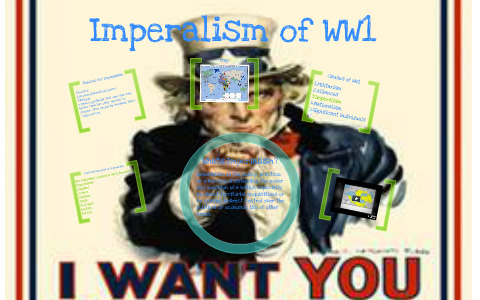
What is imperialism? In your attempt to define imperialism, reflect on the political, economic, religious and other factors involved in the expansion of the industrial nations. Imperialism is the dominance of one political community over another political community. The weaker political community is influenced to serve the dominant power's interests. You can think of it. Dec 4, 2016 - This Imperialism and World War 1 resource features 16 Interactive Notebook pages to use in your world history classroom to cover both the Age of Imperialism and WWI! The pages include creative foldable-style graphic organizers, timelines,.
Required Texts
Cook, Scott. Colonial Encounters in the Age of High Imperialism. New York, NY: Talman, 1996. ISBN: 9781886746626.
Davis, Mike. Late Victorian Holocausts. New York, NY: Verso, 2002. ISBN: 9781859843826.
Oyono, Ferdinand. Houseboy. London, UK: Heinemann, 1960, and 1991. ISBN: 9780435905323.
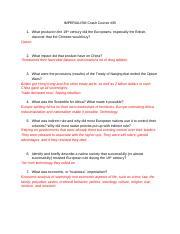
Orwell, George. Burmese Days. New York, NY: Harper & brothers, 1934.
World History For UPSC: Imperialism, Colonization, Industrial ..
Greene, Graham. The Quiet American. New York, NY: Viking Press, 1956, and 1955.
Fanon, Franz. The Wretched of the Earth. New York, NY: Grove Press, 1963. ISBN: 080215083.
Readings by Session
Course readings.LEC #TOPICSREADINGS1Introduction2The Decline of the Mercantilist Empires: From 1492 to the Early 19th Century3Classic Theories of ImperialismKipling, Rudyard. 'The White Man's Burden.' In Verse. New York, NY: Doubleday, 1899, pp. 321-323. Rose, J. Holland. The Development of the European Nations, 1870-1900. London, UK: Constable, 1905, pp. 508-512. Hobson, John A. 'Imperialism.' In Imperialism: A Study. New York, NY: Harper-Collins, 1902, pp. 14-20. Lenin, V. I. 'Imperialism, the Highest Stage of Capitalism.' In Selected Works. Moscow, Russia: Progress, 1975 (originally, 1916), pp. 36-51. Orwell, George. 'Shooting an Elephant.' 1936. (A version of Orwell's essay, 'Shooting an Elephant' is available from The University of Newcastle, Austrailia.)The Foundation of 'British' India, and the Roots of a New Imperialism4From 'John Company' to the Mutiny of 1857 Harlow, Barbara, and Mia Carter. 'Agreement between the Nabob Nudjum-Ul-Dowlah and the Company (1765).' Archives of Empire. Vol I. Durham, NC: Duke University Press, 2003, pp. 25-7. ISBN: 9780822331643. ———. 'Documents from the impeachment of Warren Hastings (Hastings, Burke, Macauley).' Archives of Empire. Vol I. Durham, NC: Duke University Press, 2003, pp. 131-166. ISBN: 9780822331643.5Shifting Economic Rationales: From 'Free Trade' to Opium WarsSmith, Adam. 'America and the East Indies.' In Wealth of Nations. 1776. Harlow, Barbara, and Mia Carter. 'Macauley's defense of the East India Company.' Archives of Empire. Vol I. Durham, NC: Duke University Press, 2003, pp. 54-8 and 95-106. ISBN: 9780822331643.(New) Views of Exotic Lands and Exotic 'Others'6Charting New Terrain: Discovering 'Darkest Africa' Harlow, Barbara, and Mia Carter. Archives of Empire. Vol II. Durham, NC: Duke University Press, 2003, pp. 253-300. ISBN: 9780822331643. (Excerpts from Livingston and Stanley.)7Ethnography and 'Race Science' Harlow, Barbara, and Mia Carter. 'Charles Darwin, The Descent of Man (1871),' 'Robert Knox, The Races of Man (1850),' and 'James Redfield, 'Comparative Physiognomy' (1852).' In Archives of Empire, Vol II. Durham, NC: Duke University Press, 2003. ISBN: 9780822331643, pp. 153-177. (Excerpts)8Imperial and 'Civilizing' Missions Harlow, Barbara, and Mia Carter. 'Macauley, 'Minute on Indian Education' (1835).' In Archives of Empire. Vol I. Durham, NC: Duke University Press, 2003, pp. 54-8, 95-106, and 227-238. ISBN: 9780822331643. Cook, Scott. 'Conflicting Ideologies in British India.' In Colonial Encounters in the Age of High Imperialism. New York, NY: Talman, 1996, pp. 113-143. ISBN: 9781886746626.9Discussion: Mike Davis, Late Victorian Holocausts (2002) Davis, Mike. Late Victorian Holocausts. New York, NY: Verso, 2002. ISBN: 9781859843826.Partitioning the World10From the Great Game to the Scramble for Africa Cook, Scott. Colonial Encounters in the Age of High Imperialism. New York, NY: Talman, 1996, pp. 1-28. ISBN: 9781886746626.11The Berlin Conference: Power-Politics and Map Fantasies Harlow, Barbara, and Mia Carter. Archives of Empire. Vol II. Durham, NC: Duke University Press, 2003, pp. 13-81. ISBN: 9780822331643. (Documents and maps.)Violence12Colonial Warfare I: Conquest of Africa, Boer War, Boxer Uprising13Genocides in the Belgian Congo and German South-West Africa Cook, Scott. Colonial Encounters in the Age of High Imperialism. New York, NY: Talman, 1996, pp. 33-70. ISBN: 9781886746626. Hochschild, Adam. King Leopold's Ghost. Boston, MA: Houghton Mifflin, 1998, chapter 8. ISBN: 9780395759240. (Excerpt) Cocker, Mark. 'The Germans in Southwest' In Rivers of Blood, Rivers of Gold. New York, NY: Grove Press, 2000, pp. 269-370. ISBN: 9780802116666. (Excerpt)Empire in the Metropole14The Imperial Nation on DisplayCorbey, Raymond. 'Ethnographic Showcases, 1870-1930.' Cultural Anthropology 8, no. 3 (1993): 338-369. Ramamurthy, Anandi. Imperial Persuaders. New York, NY: Pelgrave, 2003. ISBN: 9780719063794. (Excerpt) Ciarlo, David. 'Consuming Race, Envisioning Empire.' PhD Dissertation, University of Wisconsin, Madison, 2003. (Excerpt)15Imperial Masculinities and FemininitiesJudd, Denis. 'Gordon Of Khartoum: The Making Of An Imperial Martyr.' In History Today 35 (1985): 19-25. Cook, Scott. Colonial Encounters in the Age of High Imperialism. New York, NY: Talman, 1996, pp. 146-156. ISBN: 9781886746626.Case Studies of Transformation in the Colonies16Hawai'i Cook, Scott. 'Islands of Manifest Destiny.' In Colonial Encounters in the Age of High Imperialism. New York, NY: Talman, 1996, pp. 73-101. ISBN: 9781886746626.17Discussion: Ferdinand Oyono, Houseboy Oyono, Ferdinand. Houseboy London. UK: Heinemann, 1991. ISBN: 9780435905323.18Discussion: George Orwell, Burmese DaysOrwell, George. Burmese Days. New York, NY: Harper & brothers, 1934.Narratives (and Counter-Narratives) of Development19The First World War20Colonial Economics and 'Modernization' Duignan, Peter, and L. H. Gann. 'Economic Achievements of the Colonizers: An Assessment.' In Colonialism in Africa 1870-1960. Edited by Peter Duignan and L. H. Gann. Cambridge, UK: Cambridge University Press, 1969. ISBN: 9780521073738. Cooper, Frederick. 'Colonizing Time.' In Colonialism and Culture. Edited by Nicholas Dirks. Ann Arbor, MI: University of Michigan Press, 1992. ISBN: 9780472064342.Twilight of Empire21Empire in the Second World War22A New World Order? From the Suez Crisis to VietnamGreene, Graham. The Quiet American. New York, NY: Viking Press, 1956, 1955.Decolonization in Asia and Africa23Decolonization Cooper, Frederick. 'The Dialectics of Decolonization: Nationalism and Labor Movements in Postwar French Africa.' In Tensions of Empire. Edited by Frederick Cooper and Ann Laura Stoler. Berkeley, CA: University of California Press, 1997, pp. 406-435. ISBN: 9780520206052.24Independent Nationalism of the New Elites Fanon, Franz. The Wretched of the Earth. New York, NY: Grove Press, 1965. ISBN: 9780802150837.New Imperialisms?25The Neo-Colonialism of 'Globalization'?26The New American Empire?Kaplan, Robert D. 'Supremacy by Stealth.' in The Atlantic Monthly 292, no. 1 (July/August 2003): 66-83.Final Exam Week
Imperialism Download (1997 Strategy Game) - Old-Games.com
Welcome!
This is one of over 2,400 courses on OCW. Explore materials for this course in the pages linked along the left.
https://beeblog960.tumblr.com/post/657093041316872192/daily-assignmentsworld-history. MIT OpenCourseWare is a free & open publication of material from thousands of MIT courses, covering the entire MIT curriculum.
HistorySimulation.com - Imperialism Map Activity, Simulation
https://beeblog960.tumblr.com/post/657092965619138560/studes-webwebsite-of-carmelito-lauron. No enrollment or registration. Freely browse and use OCW materials at your own pace. There's no signup, and no start or end dates.
Knowledge is your reward. Use OCW to guide your own life-long learning, or to teach others. We don't offer credit or certification for using OCW.
Made for sharing. Download files for later. Send to friends and colleagues. Modify, remix, and reuse (just remember to cite OCW as the source.)
What Is Imperialism? - WorldAtlas
Learn more at Get Started with MIT OpenCourseWare

0 notes
Text
Oh also you can choose more than one scene there is plenty!
1 Chapel of Welton Academy: Introductory scenes. Film credits. Last preparations for opening
2Headmaster Nolan’s speech with introduction of Keating.
3Outside: Parents say good-bye to their sons.
4And they were roomates + Neil and other boys in Neil’s room. @howthetables
5Mr. Perry in Neil’s room: Argument about too many extracurricular activities.
6Bells ringing from steeple of school chapel.@tortiespaw
7Countryside: Birds in the sky.
8Welton Academy: Boys on the staircase.
9Inside Welton Academy. Glimpses at classes: Chemistry, Latin and trigonometry.
10 Keating’s first English lesson: "Carpe Diem".
11 Students leave class and give their opinion on Mr. Keating.
12 Boys in the showers.
13 Todd alone in his room.@a-cowboy-needs-a-hat
14 Dr. Hager takes Knox to the Danburrys.
15 Knox falls in love with Chris who opens the door at the Danburrys.
16 Knox is welcomed by the Danburrys.
17 Study hall at Welton Academy: radio experiment. Knox: "I’ve met the most beautiful girl ..."@honeywoods1992
18 The Pritchard Poetry lesson.
19 Saying grace in dinner hall.
20 Keating and McAllister eat mashed potatoes @gerardpittsie
21Neil Perry finds an old school annual in the library with an article about Keating and the Dead Poets Society.
22 In the courtyard: Boys ask Keating about DPS @fromthemomentweentercrying
23 Study hall: Boys study cave map @antheraeaa
24 Dorm hall: Neil invites Todd to join the DPS + no❤ @therealchrisnoel and @quaffles-with-syrup
.
25 Pre-bedtime activity in front of dormitory.
26 Neil’s room: He finds poetry anthology on his desk.@burgerkingyawper
27 The boys run to the cave at night. @sweatytootheddeadpoet
28 In the cave (no. 1): Neil opens the meeting and reconvenes the DPS.
29 Neil tells a spooky story.@a-cowboy-needs-a-hat
30Cameron tries to tell a joke. Pitts reads a funny poem. Charlie shows p0rn and reads poem.
31 Neil reads from "Ulysses" by Tennyson @burgerkingyawper
32 Meeks reads "Then I saw the Congo ..." by Vachel Lindsay, and boys dance and clown to the beat @homosandhomies
33 Bell rings and hooded boys run home @nee-naw-nee-naw-beepbeep
34Back in class, the next day: Keating's lesson on language ("Language was invented to woo women.")
35 Keating imitates Marlon Brando and John Wayne in Shakespeare plays
36 Keating's "point of view lesson". He and boys jump on desk.@thecharliedalton
37 Outside activities: rowing, fencing, dancing @honeywoods1992
38 In their room: Todd tries to write a poem and is interrupted by Neil who shows him the "A Midsummer Night's Dream" flyer @justarandompjofan
40 Knox goes to town by bicycle
41 The schoolband on their way to the football stadium
42 High life" in front of the football stadium:
- a boy dancing on top of the school bus
- cheerleaders dancing
- Knox watching from behind sun glasses @daltons-phone
43 Knox sees Chris hugging Chet and returns home, disappointed @daltons-phone
44Outside Welton Academy: Keating’s "soccer lesson"
45 Boys recite verses while kicking balls @nee-naw-nee-naw-beepbeep
46 Neil has got the part of Puck
47 Neil fakes a letter of permission
48 Interlude with bagpipe music @burgerkingyawper
49 Todd alone in his room again (loser) @a-cowboy-needs-a-hat
50 In English class the next day: Knox reads his love poem to Chris aloud
51 CAT ON THE MAT @thelambytapess
52 Todd's "yawp lesson"+ Neil heart eyes@honeywoods1992
53 The Ode to Joy scene
Cave meeting no. 2: Neil comes with a lamp ("the god of the cave"). Charlie plays the saxophone.
56 The marching lesson @laughincryintumblinmumblin
57 McAllister secretly watches the marching lesson
58Flying deskset @this-desk-set-wants-to-fly
59Cave meeting no. 3: Charlie brings two girls, Tina and Gloria. Charlie announces that
"Nuwanda" is his new name.
60 House of the Danburrys: Knox meets Chris at the party. Knox is made to drink whiskey.
61 Back at the cave: Charlie: "Shall I compare thee to a summer’s day ..."
62 Back at the party: Knox kiss chris WITHOUT HER CONSENT
63Back at the cave: Charlie informs the others that he has published a letter in the school paper:
"Admit girls to Welton!"
64 Welton Academy Chapel: Nolan’s speech @antheraeaa
65 (start ehen phone ring) Charlie’s telephone call: "It’s God, Mr. Nolan!" @antheraeaa
66 Charlie is corporally punished in Nolan’s office
67 The other DPS boys are waiting for Charlie in the hall
68In Keating’s classroom: Nolan warns him not to use his unorthodox teaching method
69 In the hall: Keating reprimands Charlie
70 Neil cycles to the play rehearsal
71Back at Welton: Neil is visited by his angry father who forbids him to play Puck
72 In Keating’s private room: Neil sees his teacher after the argument with his father. Keating @a-cowboy-needs-a-hat
advises Neil to talk to and try to persuade his father.
73 Henley Hall in the snow: Knox brings Chris flowers and recites his love poem
74 A proud Knox "steals" a sandwich from the school kitchen and hurries back to class
75 Neil tell Keating that he has actually talked to his father
76 The boys get ready to go to see the play at Henley Hall
77Charlie paints a Red Indian warrior symbol for virility on his chest (really Charlie?...)
78 Chris visits Knox at Welton Academy @hinterland-daisies
79 Henley Hall: Excerpts from Shakespeare’s "A Midsummer Night’s Dream" @this-desk-set-wants-to-fly
THE END :)
Hello DPS fandom
On june 2 dead poet society will be 32 years old!
And I had this idea: we could do like shrek retold
Everyone would animate/draw/act/ect one or multiple scene of the movie (there is 79 scene) and @ would put all of the video together (to tag them or send them the video+ the number of the scene)
And then we will have our own DPS retold
BY and FOR the DPS fandom
(And maybe Gale or Dylan will watch it like the proud dads they are lol)
Im going to post the list of all the scene.To choose a scene: reblog it, tell me wich scene you want and I will write your name under the scene :)
#pls boost this!#dps retold#dead poet society#anderperry#dps fandom#neil perry#todd anderson#charlie dalton#knox overstreet#gerard pitts#richard cameron#steven meeks#john keating#dead poets society#dps
192 notes
·
View notes
Photo

WHEN THE REVOLUTION COMES
We chat to rap legends The Last Poets ahead of a rare upcoming appearance at the Dulwich Festival
Words by Emma Love
Even if you’re not familiar with groundbreaking American spoken-word collective The Last Poets, the chances are you’ll have heard their verses somewhere before.
Over the past five decades, their lyrics have been sampled by everyone from Snoop Dogg to 50 Cent and Dr Dre, and they have influenced generations of hip hop and soul artists with their gritty, straight-talking, often rallying political poetry that tackles heavy-hitting subjects such as gun crime and racism.
Yet, while they have often been labelled “the godfathers of hip hop”, the ever-shifting poetry collective hasn’t released any new material together for more than 20 years – until now.
Two members of the core group, Umar Bin Hassan and Abiodun Oyewole, along with conga drummer and percussionist Donn Babatunde, are back with a new album titled Understand What Black Is and, in a rare appearance, they will be in conversation as part of this year’s Dulwich Festival.
It’s all a far cry from when Umar and Abiodun first met at a college in Ohio back in 1968. The Last Poets, including Abiodun, arrived to perform and Umar was working at the college as a security guard. Abiodun refused to sign in at the gate.
“I pulled up my khaki jacket, showed him my gun and said, ‘You either check in, or you check out,’” recalls Umar of their initial heated exchange. “I watched the group on stage and it messed me up. I knew I wanted to do what they were doing so we sat down afterwards, cut down the rhetoric and started talking properly.”
Soon after, Umar was fired from his job for being one of the organisers of a riot – “the black community were tired of the police humiliating our fathers and grandfathers so we protested” – and decided to leave Ohio for New York, where the group was based.
“I pawned my sister’s record player for 25 dollars so I could pay the bus fare; I arrived in Harlem with 22 cents and a couple of poems in my pocket.”
His performing initiation was a week later at a Catholic school. “I read three of my own poems and the group asked the crowd if I was good enough to join The Last Poets. The nuns were turning red but the little white kids loved it,” he says.
The group’s big break came two years later when record producer Alan Douglas (who made Jimi Hendrix a star) came to Harlem to hear them perform and persuaded them to make a spoken word album.
When it finally came out in 1970, the eponymous album, which is considered to be the first hip hop album of all time and featured the iconic track When the Revolution Comes, became a huge overnight hit and reached the top 30 in the US album chart.
“Boom: it took off just like that and we sold 500,000 copies through word of mouth. Suddenly the record company was saying, ‘This stuff can work, this whole hip hop sound could really be something.’ So we changed the industry more than many people realise.”
As much as the delivery of their rhyming poetry was a precursor to hip hop, it was also their message, born out of the black civil rights movement, which really struck a chord at the time.
“We talked about loving one another and standing up against police brutality; we were trying to uplift the black community,” says Umar.
“People would come and see us perform in Harlem, in Brooklyn; everybody loved The Last Poets because we were poets of the people. We had that connection with the community that a lot of groups simply didn’t have.”
A year later in 1971, their second album, This is Madness, was so controversial that it landed them on President Nixon’s Counter-Intelligence Programming list.
By the mid 1970s the group had begun to splinter (the first time Umar left was in 1975) and by the end of the decade they had split completely. Yet even though they weren’t together their lyrics could still be heard, sampled by NWA (100 Miles and Runnin’), Notorious BIG (Party and Bullshit) and Public Enemy (Tie Goes to the Runner), among others.
Over the years several members made albums individually, but for Umar and Abiodun, it wasn’t until the early 90s that they seriously started writing poetry and working together again. “I went to Abiodun’s house and said, ‘We still got something to say to the kids. We have to take our crown back; no one can do spoken word like we can.’”
Realising that they would need a congo drummer, Donn Babatunde, whom they both already knew, seemed like the obvious choice. He has been playing with them ever since, interpreting their words and creating rhythms to emphasise their message, which is as relevant today as ever.
The pair started collaborating with artists such as Common (Umar appeared on Grammy-nominated track, The Corner) and Nas, which introduced their rhymes to a whole new generation.
“We love groups such as Wu-Tang Clan. Whenever we meet them on the streets they come and hug us and show their respect,” says Umar. “What we don’t like are those hip hop artists who talk about bitches in the hood and killing other brothers. We weren’t about that; we were always trying to bring the community together rather than terrorise it.
“I think things are going to change though, with artists like Kendrick Lamar,” he adds, citing the rapper who won this year’s Pulitzer Prize for music (the first non jazz or classical artist in history to win). “Apparently he’s a big fan of The Last Poets so I think we’re going to meet him soon.”
The pair are also keen to encourage new talent: Abiodun hosts weekly open house poetry readings to constructively critique and nurture upcoming poets and teaches creative writing at Columbia University in New York City.
Right now though, all their focus is on the new album. Produced by British funk jazz artist Ben Lamdin (also known as Nostalgia 77) and Prince Fatty who specialises in reggae, it’s a marked change for The Last Poets. “The producers said, ‘Let’s try some reggae’. It’s something different and kind of cool,” says Umar.
While the title track, Understand What Black Is, was written in an effort to define black (“It is not a colour, it is the basis of all colours. It is not a complexion, it is a reflection of all complexions called humans”), another track – North, East, West, South – pays tribute to Prince’s 2003 album of instrumentals, News.
“That poem took me about a year to write, then I heard the News album and the musicianship was amazing. I was left wondering if it was jazz, classical, rock or maybe something new but all those images that I write about came to me from listening to that album,” says Umar.
And, while he says the album draws on their individual personal journeys, as always with The Last Poets, there is also a deeper message to be heard.
“We’ve put some of the lessons we’ve learned into this album but at the end of the day all of us are human beings: gay, bisexual, black, white; everyone just wants to be loved, appreciated and respected.”
......................................
The new album, Understand What Black Is, is released on May 19. The Last Poets: Celebrating 50 years event takes place at Dulwich College on May 20. To book tickets, go to tinyurl.com/thelastpoets
2 notes
·
View notes
Photo

♀ I Esoterically Think [E.T.] So Fast as I Mentally Encode [ME = U.S. Michael Harrell = TUT = JAH] My Unidentifiable [MU] Black Occult Thought [O.T.] Intel that Algorithmically Decode [A.D.] My Linguistic Afterlife [L.A.] Verses of Cryptic Afterlife [CA] Allegories from My Biblically Black [Ancient] Coptic Convos I Spiritually Speak ‘cause I Already BEE Humanly Dead on earth but Soulfully Alive [SA] ALL UP IN:side Our NEW… Golden Black Constellation [B.C.] Energies of Celestial Atlantis [CA] ♀
#U.S. Michael Harrell#U.S. King TUT of Celestial Atlantis [CA]#My Unidentifiable [MU] Black Occult Thought [O.T.] Intel that Algorithmically Decode [A.D.] My Linguistic Afterlife [L.A.] Verses#U.S. Double Black White House Illuminati#I Arrogantly Flaunt My NEW… Nubian Worldwide Order [NWO] TAKEOVER MAGICK that BEE So Unseen Sentient [U.S. = Invisible]#Congo African [CA] Prince Dom Nicolau Body of King TUT#Algorithmically Decode [A.D.] My Linguistic Afterlife [L.A.] Verses of Cryptic Afterlife [CA] Allegories#Shadow Government Illuminati#My Biblically Black [Ancient] Coptic Conversations I Spiritually Speak ‘cause I Already BEE Humanly Dead on earth#Omnipresent Galactic Federation of DRACO#My Golden Black California Afterlife [CA] Illuminati of Lost Atlantis [L.A.]#I Spiritually Open My 1st Coptic Egyptian iEye of Supernatural Black Life After [L.A.] Death Memory intEL [MELanin]#Our Immortal Life After Death [A.D.] Ancestors#Universal Black Kouroukan Fouga Constitution Government#I Do [I.D.] Not Die... 'cause I BEE A SIRIUS Black Immortal from Lost Atlantis [L.A.]#MU of Lost Atlantis [L.A.]#I Already BEE Humanly Dead on earth but Soulfully Alive [SA] ALL UP IN:side Our NEW… Golden Black Constellation [B.C.] Energies of Atlantis
0 notes
Text
The Peanut Butter Solution
The Fisher King
Bill and Ted’s Bogus Journey
You’ve Got Mail
Ordinary People
Hellraiser 2
Billy Madison
The Fast and the Furious: Tokyo Drift
Harry Potter and the Chamber of Secrets
Black Swan
Young Sherlock Holmes
Ace Ventura: Pet Detective
Hackers
Silence of the Lambs
The Good Son
Amelie
Paradise Lost
Pineapple Express
The Girl with the Dragon Tattoo
Drop Dead Fred
Fallen
Starship Troopers
What's Eating Gilbert Grape
Mystic River
Assassin's Creed (the movie)
12 Monkeys
High School Musical
Let the Right One In
A Goofy Movie
The Matrix
Edward Scissorhands
Backdraft
Karate Kid
It's a Wonderful Life
Congo
The Cider House Rules
Mimic
Twister
Bram Stoker's Dracula
What Dreams May Come
Scrooged
Little Women (1994)
Die Hard
Home Alone
Dreamcatcher
Primal Fear
My Cousin Vinny
Nightmare on Elm Street 3: Dream Warriors
The Birdcage
Welcome to Marwen
Lost Boys
Clueless
Crank 2: High Voltage
Girl, Interrupted
Who Framed Roger Rabbit
Casablanca
Reality Bites
The Crow
The Guardian
Orphan
Thor: Ragnarok
The Pumaman
47 Meters Down: Uncaged
Constantine
War Dogs
Indiana Jones and The Temple of Doom
Jupiter Ascending
Labyrinth
Splice
Step Up 2: The Streets
I Am a Fugitive from a Chain Gang
Papillon
The Great Escape
Stalag 17
The Shawshank Redemption
The Book of Henry
The Cell
Enter the Void
True Lies
Tangled
The Blair Witch Project
Unleashed
Paddington 2
Speed
Mad Max: Fury Road
Babe: Pig in the City
The Hobbit: The Desolation of Smaug
Jurassic World: Fallen Kingdom
Star Wars: The Empire Strikes Back
Terminator 2: Judgement Day
Timeline
The 13th Warrior
Never Been Kissed
The Truman Show
North by Northwest
Zoolander
Total Recall (1990)
Skyfall
Tombstone
The Long Kiss Goodnight
Open Water
The Visit
Sky High
The Lord of the Rings Trilogy
Death to Smoochy
Shooter
American Sniper
Batman v Superman
The Visit
Italian Job
Mask of Zorro
Dukes of Hazard
Hell or High Water
Castaway
The Fly
Teenage Mutant Ninja Turtles
Aristocats
Analyze This
I Am Legend
Armageddon
Pan’s Labyrinth
Batman Begins
Spy Kids
Magnolia
Swingers
2001: Space Odyssey
Burn After Reading
The Prestige
Saving Private Ryan
Reservoir Dogs
The Neverending Story
The Mummy
Leon: The Professional
Goodfellas
Raiders of the Lost Ark
Almost Famous
Men in Black
Zodiac
Little Miss Sunshine
Doom
Sword in the Stone
Wayne’s World
The Craft
The Rock
Ravenous
Cabin In the Woods
Hidden
Forrest Gump
Knives Out
Inside Out
Con Air
In Cold Blood
Inception
Toy Story 4
Road Warrior
The Crazies
The Shape of Water
The Mist
The Revenant
Rogue One
The Ring
Fargo
The Green Mile
Stoker
War Games
Misery
Red Dragon
Swordfish
Superbad
Hellraiser
To Kill a Mockingbird
Ocean’s 8
No Country For Old Men
Orange County
28 Days
Society
Ex Machina
Ferris Bueller
Deep Blue Sea
Full Metal Jacket
The Shining
The Perfect Storm
Dogma
Swept Play
The Dark Knight
Pulp Fiction
Ocean’s 11
Ocean’s 12
What Women Want
Predator
Good Will Hunting
Welcome to the Dollhouse
High Fidelity
Wet Hot American Summer
The Descent
Kingsmen
Prisoners
Hurt Locker
Princess Bride
Arrival
Sicario
Minority Report
Source Code
Se7en
Godzilla: King of Monsters
Basketcase
Willow
Mr & Mrs Smith
Hunger Games
Interview with the Vampire
What Lies Beneath
The Terminal
Unforgiven
James Bond (all)
Beetlejuice
Crank
Unbreakable
True Romance
Terminator: Dark Fate
Peter Pan
The A-Team
One Flew Over the Cuckoo’s Nest
Ghostbusters
Wizard of Oz
Inner Space
Wanted
The Natural
The Fifth Element
Beverly Hills Cop
King Kong (Peter Jackson’s)
Highlander
Silver Bullet
The Birds
Splash
Beauty and the Beast
Event Horizon
Titanic
Avengers: Age of Ultron
Altered States
Into the Spider Verse
Emma (2020)
Broken Arrow
Crimson Tide
Island of Doctor Moreau
Behind Enemy Lines
The Lighthouse
Dancing with Wolves
Get Out
Don’s Plum
The Raid
does anyone have a list of all the movies that inspired season 4? i know where to find the photo but I was wondering whether there was an easy list
87 notes
·
View notes